Review of the Terramaster T9-423 NAS Drive
Terramaster has really been remarkably busy in 2022 releasing their new range of hardware and software developments to their steadily growing audience. Although still considered very much the value brand in the network-attached storage industry, the speed at which this company continues to evolve in order to remain competitive with bigger brands such as Synology and QNAP continues to impress. Alongside the release of refreshes of their existing 2-Bay and 4-Bay NAS systems, Terramaster has also released several new unique devices to their portfolio and multiple new scales of server in 6-Bay, 9-Bay and 12-Bay. Today, I want to talk about a particularly unique NAS, the T9-423, a 9-bay desktop server that manages to borrow elements in its design from both desktop and rackmount chassis. Arriving with a multimedia-friendly CPU, 2.5Gbe, NVMe SSD storage options and a pretty high design quality level, the new terramaster T9-423 is a device that you are likely going to either love or hate. This new chassis (technically the first 9x I have ever seen, if you discount the QNAPs TS-9xx hybrid storage systems) The new T9-423 certainly is an unusual beast, but does it deserve your data? Let’s find out.
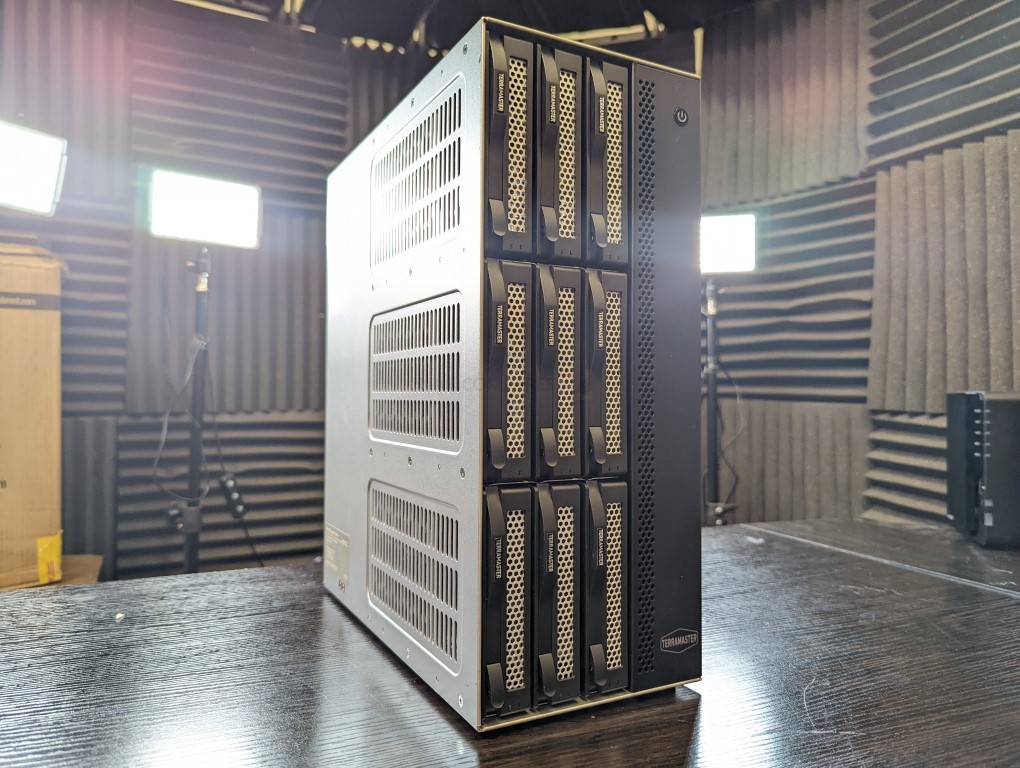
Terramaster T9-423 NAS Review – Quick Conclusion
I like the terramaster T9-423 NAS a lot more than I thought I was going to! Over the years I have seen several quirky NAS designs appear from brands looking to find gaps in the existing market between the traditional 2-bay, 4-bay, 8-bay and rackmount systems. In most cases, these brands tend to never really hit the ground running with these systems and a lot of that is because they are either priced poorly, have bad internal hardware choices for the sake of offsetting the overall cost of a new design or simply do not read the room in knowing what people want. I’m pleased to say that the Terramaster T9-423 does not seem to suffer any of these things. This 9-Bay arrives in a chassis that is a smaller and more convenient frame than many eight-bay desktops, arrives at a price point that for the scale is reasonable and has the same or better hardware than most other mid-range desktop NAS in 2022. Alongside this, Terramaster’s innovations in TOS5 to improve their platform to include many more storage services, backup methods and a few premium apps in the works means that the brand still manages to be competitive in spite of its more cost-effective reputation and hardware focus. First-party app development still pales in comparison to bigger NAS brands (though popular third-party tools that already exist in the market are supported and available to download) and in terms of software, this system is still a little underwhelming, if very functional. Then you have the build quality. The construction of this chassis is particularly higher than I anticipated and unlike many of the brand’s rather dated or plastic-looking cases in 2 and 4 bays, The T9-423 is remarkably well constructed with excellent considerations being made to ventilation and keeping the device compact despite its large storage potential. As long as you keep in mind that you are buying a more cost-effective or value alternative to top-tier brands, as well as having perhaps a little more patience with the software than you might like, the Terramaster T9-423 is a great NAS and an exceedingly positive move by the brand to further evolve.
| Where to Buy a Product | |||
|
|
    
|

|
VISIT RETAILER ➤ |
 |
    
|

|
VISIT RETAILER ➤ |
Terramaster T9-423 NAS Review – Unboxing, Packaging & Presentation
Although the TS-9-423 NAS is a new device and there have been tweaks in its presentation, things have remained largely the same as with the packaging and protection in older units – only more so! As this is a more affordable solution, it is understandable that some areas of the retail package are going to be a little understated. Additionally, NAS systems like the T9-423 NAS are going to 99% of the time be purchased online (not in your local I.T shop or generally in line of sight at the point of sale), so the need for flashy packaging is less important. That said, many brands still put a little effort into this and present their solutions as a means to promote a brand, lifestyle or general vibe or excellence in their product (i.e. “the first bite is with the eye” etc). The Terramaster T9-423 arrives in a very plain brown box and just has the model ID with a sticker and the brand logos.
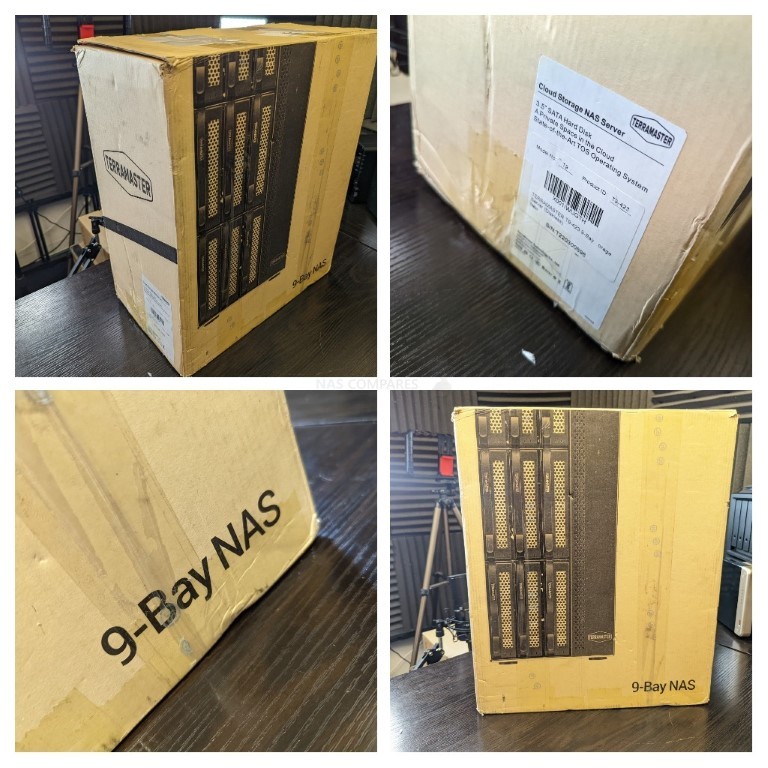
Remarks of presentation aside, the packaging of the Terramaster T9-423 is pretty good in terms of protection. The unit is well held in foam (much thicker than normal and completely encasing the T9-423) and the accessories are neatly and securely contained. There is practically no room for the system to move in transit and ultimately, that is all that matters (silent shock/motion damage to the components).
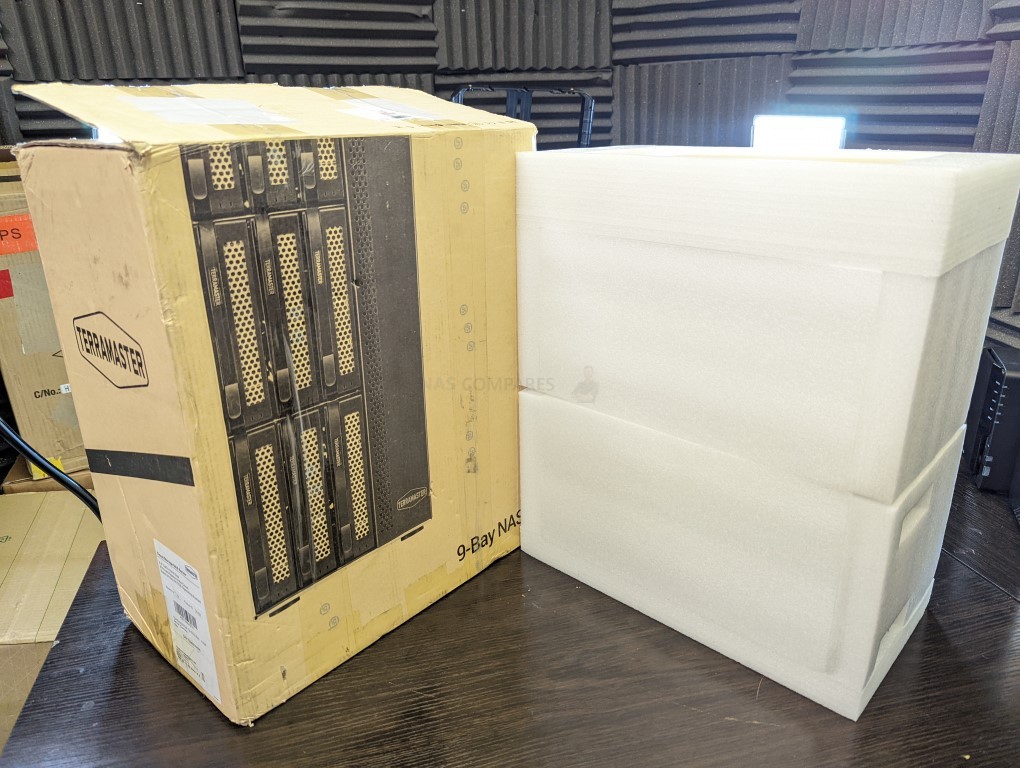
The accessories box contains lots of accessories and although most are pretty standard (setup instructions, power supplier, warranty information, screws, etc), there are a couple of unusual additional that I have never received in other brand’s products, namely the inclusion of additional HDD tray clip/screw washers and additional rubber feet for the NAS. This isn’t really a good/bad thing and for those that need them, it’s a handy addition. Just seemed an unusual addition.
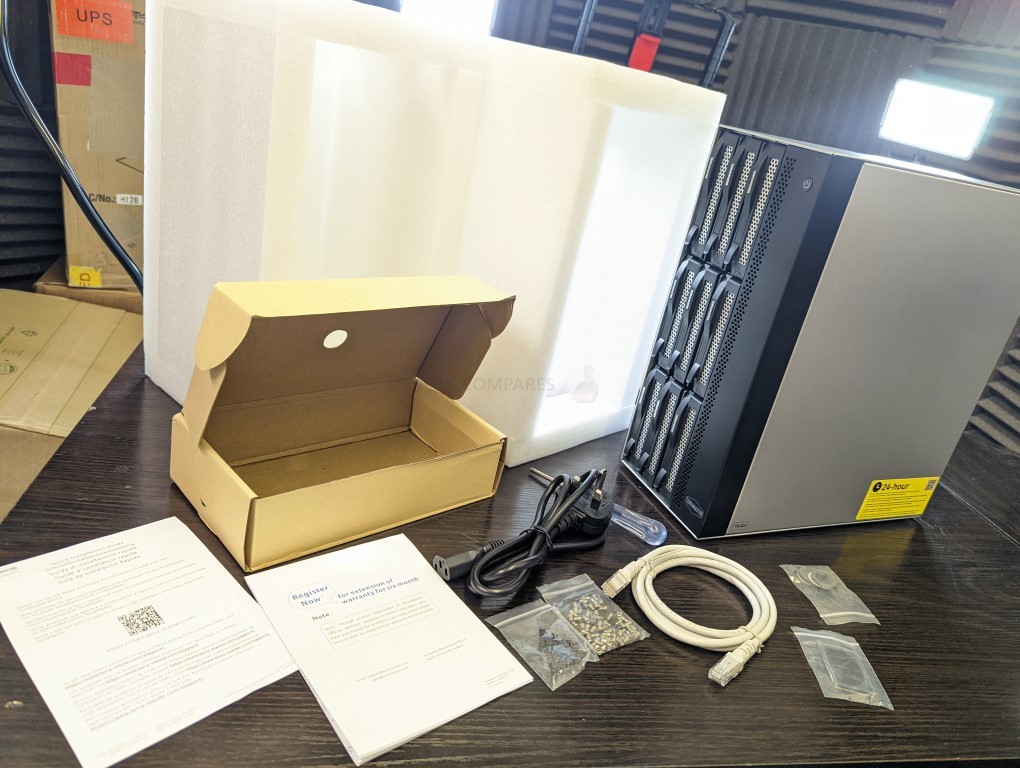
One small but positive area of note is the LAN cable included. As mentioned earlier, in more affordable NAS solutions (like more tech), the way savings can be made is by cutting corners. Therefore I was surprised that the Terramaster T9-423 arrived with a surprisingly high-quality LAN cable. Thick, Cat 6 and very high quality at the connector. Again, this is a small point, but companies such as QNAP and Terramaster HAVE provided Cat 5e cables of a shorter length, thinner material and nowhere near the quality of this one with their 1/2.5GbE solutions. It’s a VERY minor point, but this is the sort of area I would have assumed Terramaster would have saved a few £/$ on and I am impressed.
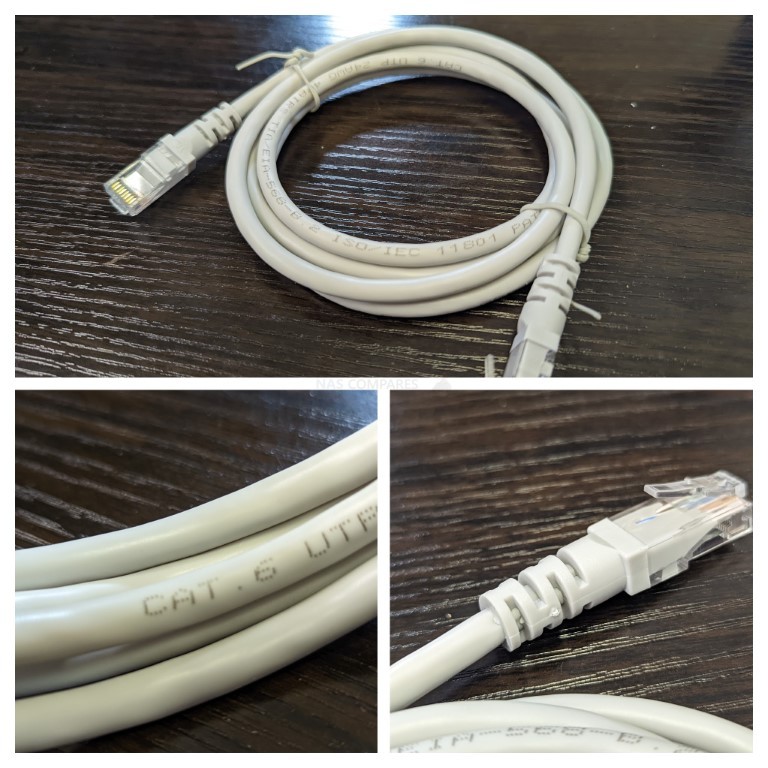
The Terramaster T9-423 arrives with an internal 250W PSU, so no external power brick for this particular desktop NAS drive. Overall, there is quite a good range of accessories included with the Terramaster T9-423. Nothing spectacular, but pretty much everything you are going to need (aside from storage media) to set up your NAS quickly and easily. Let’s discuss the design of the T9-423.
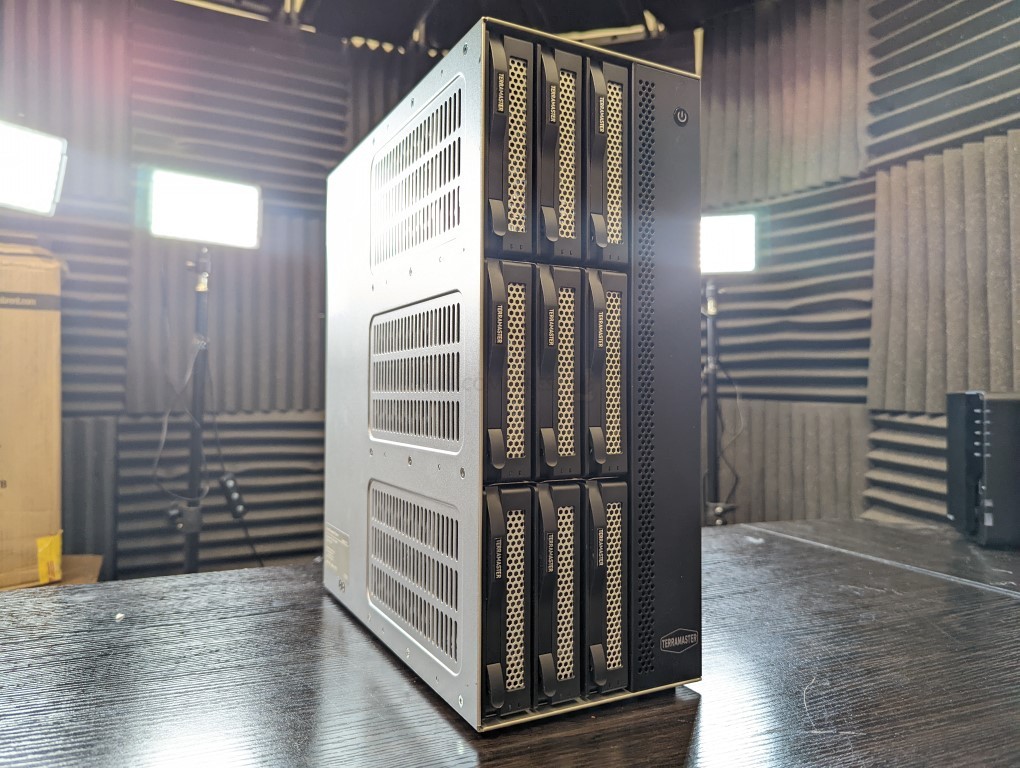
Terramaster T9-423 NAS Review – Design
Terrasmaster NAS drives are pretty distinctive. The brand has been using largely the same chassis in its 2 and 4 Bay systems for about 5 years, but in the case of this new 9-Bay system, the brand has gone a little left field. Arriving as a desktop chassis, but looking remarkably similar to that of a rackmount (only vertical), it still manages to be tremendously compact and it wasn’t until I finally had my hands on the device that I realised how much smaller it is than the official photos that are dotted around online would indicate. I was immediately impressed by the build quality of this device. The chassis is completely metal externally (save for a single plastic strip on the front), the system feels incredibly sturdy and is a huge jump up from the 50/50 plastic and metal combo chassis that are featured on the smaller NAS devices in Terramaster’s portfolio.
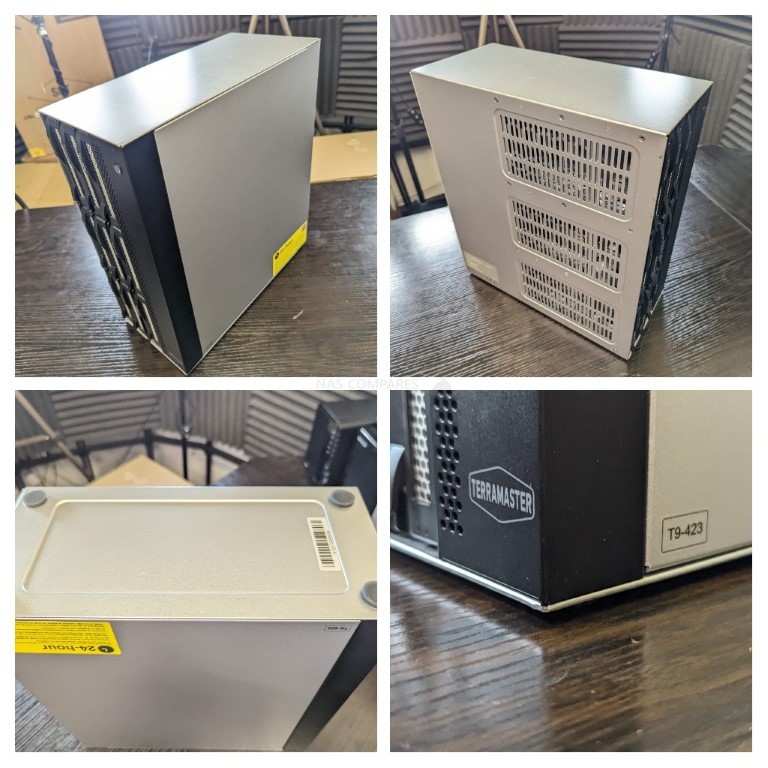
The chassis MEASURES 334 x 135 x 295mm and aaround70% of the available space is occupied by those 9 bays of storage. Although the pictures make this system look about the size of a normal PC case, it is actually a bit smaller and I was a little surprised by the scale of the system when I had my hands on it. Only one side panel can be removed (the right side, which allows access to the main motherboard for M.2 NVMe SSD access and Memory upgrades) and the overall build quality is quite high.
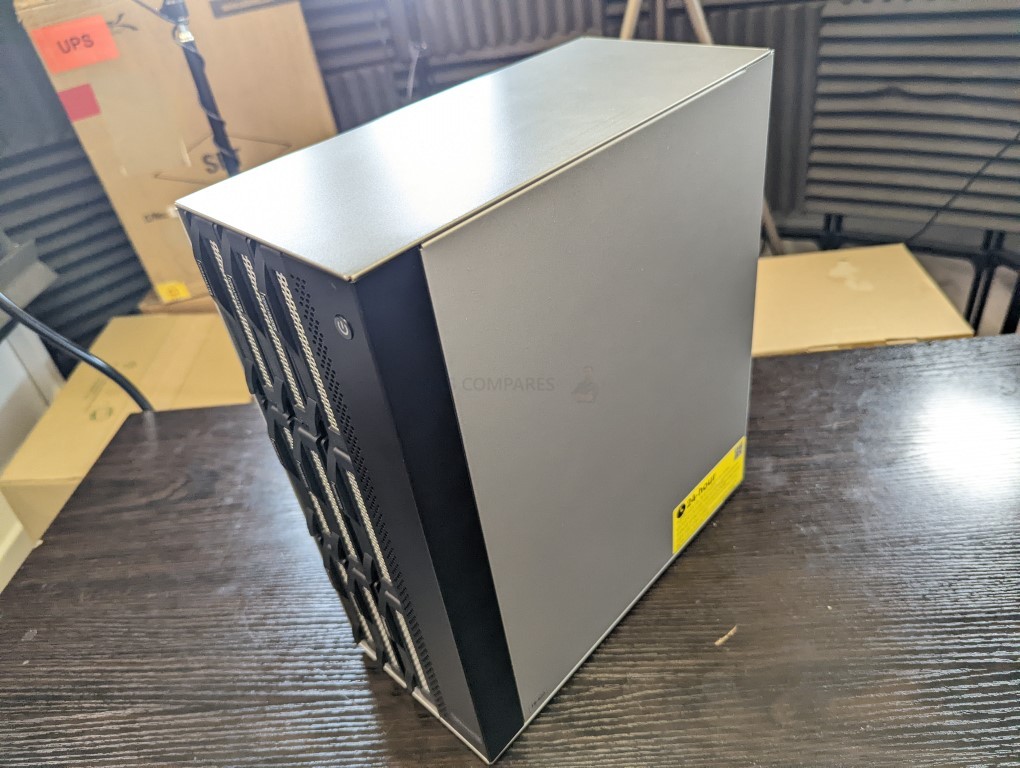
Of course, an important factor when it comes to the smooth running of this scale of storage is the cooling and ventilation afforded to the system when in use. I am pleased to confirm that the Terramaster T9-423 NAS features a tonne of ventilation throughout. Each of the bays has a metal vented panel on the front, the area above the storage with the CPU+Memory etc has its own ventilation strip, the side of the casing that is closest to the storage media has a HUGE area of ventilation and all these are being utilized passively with the three active rear cooling fans.
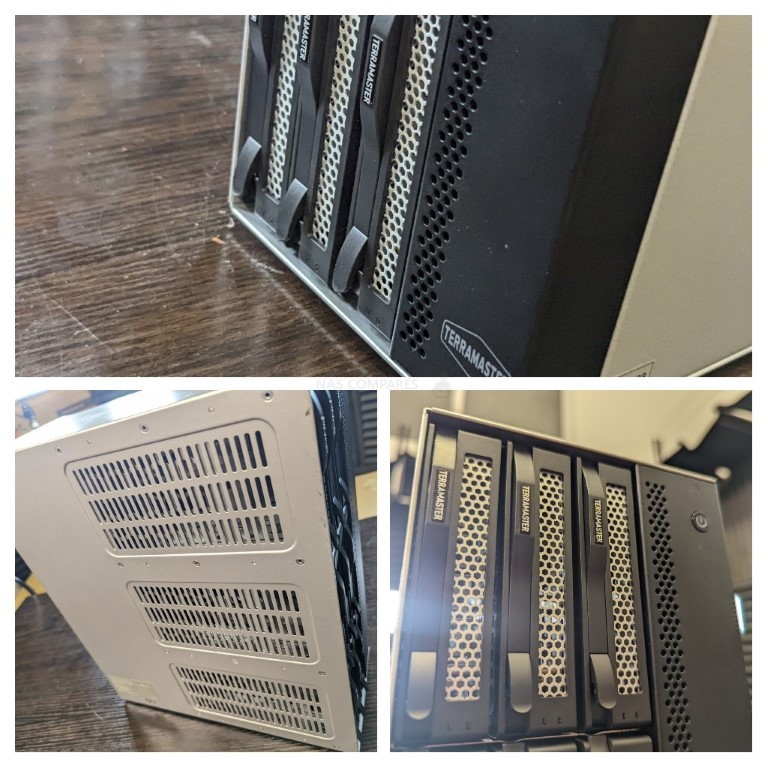
Storage media is easy to install and the system takes advantage of the popular RAID configurations (RAID 1, 5, 6, 10, etc) that the user might want to opt for. Additionally, the system can be operated with as little as a single storage drive if you want, then add drives to the storage pool gradually if you prefer. This is particularly advantageous when you note that Terramaster TOS 5 now includes TRAID – a flexible and less rigid RAID system that allows you to use mixed drive capacities in a single RAID pool, as well as making expanding storage in general much easier. The trays of the Terramaster T9-423 NAS themselves are metal, springloaded, but not lockable. They are not click and load screwless drive trays, but that’s hardly the end of the world and Terramaster include all the screws you will need.
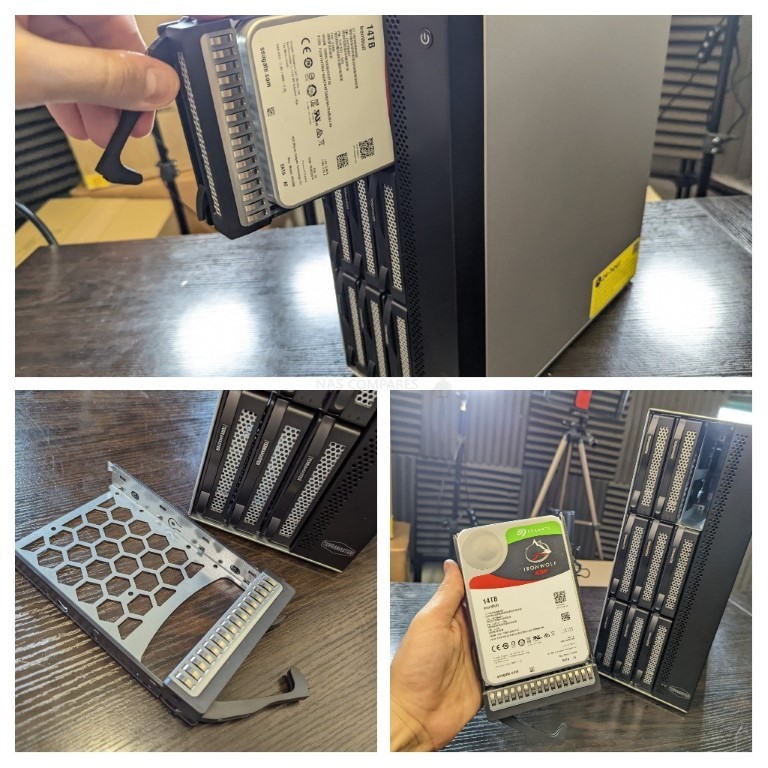
Each of the bays are SATA connected (combined data+power) and are hot-swap enabled, so no need to power down the system when connecting a new drive to a RAID for expansion or RAID repair on the fly. Each row of three drives feeds into a multi-lane cable and then directly into the motherboard (as opposed to the NAS having a separate storage board that is connected to the motherboard with a PCIe slot/angle connector as in smaller NAS systems. This is a clean and intelligent piece of design here and, again, not something we see alot of on desktop NAS devices (it is much more popular in larger rackmount design)>
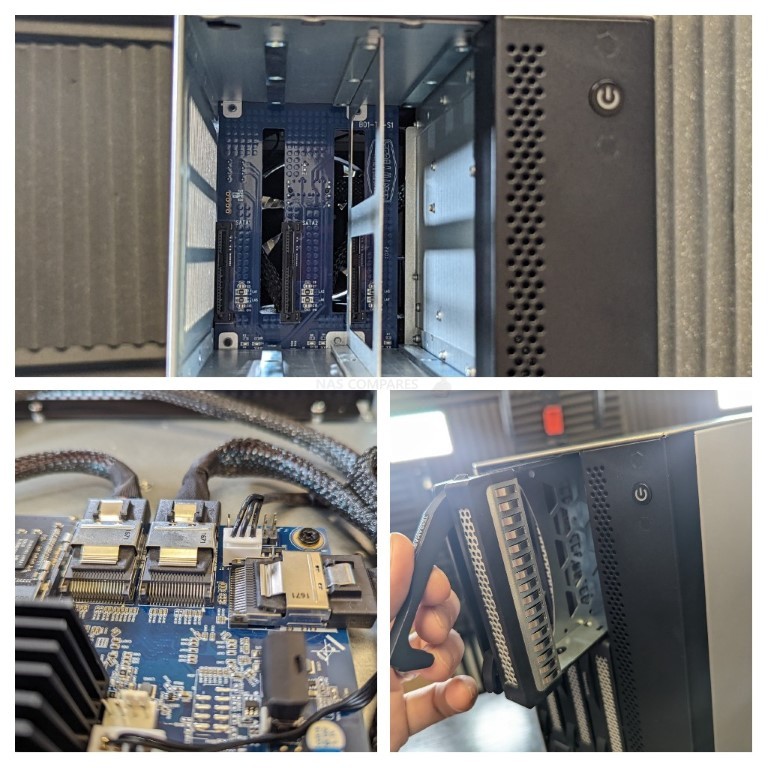
One thing about the design that we DO have to discuss a little more is the actual deployment. Opting for the vertical 3×3 arrangement of drives does mean that this device is going to be very tall and many users might have wanted something shorter but wider (i.e like most 8-Bay NAS systems). The base of the system has 4 large rubberized feet that lift the system up for whichever desktop surface it is placed on by around a 0.9cm. This is fairly normal BUT is it possible to deploy the Terramaster T9-423 NAS horizontally – i.e on it’s side, so it looks a little more like a compact rackmount that you deploy on your table top?
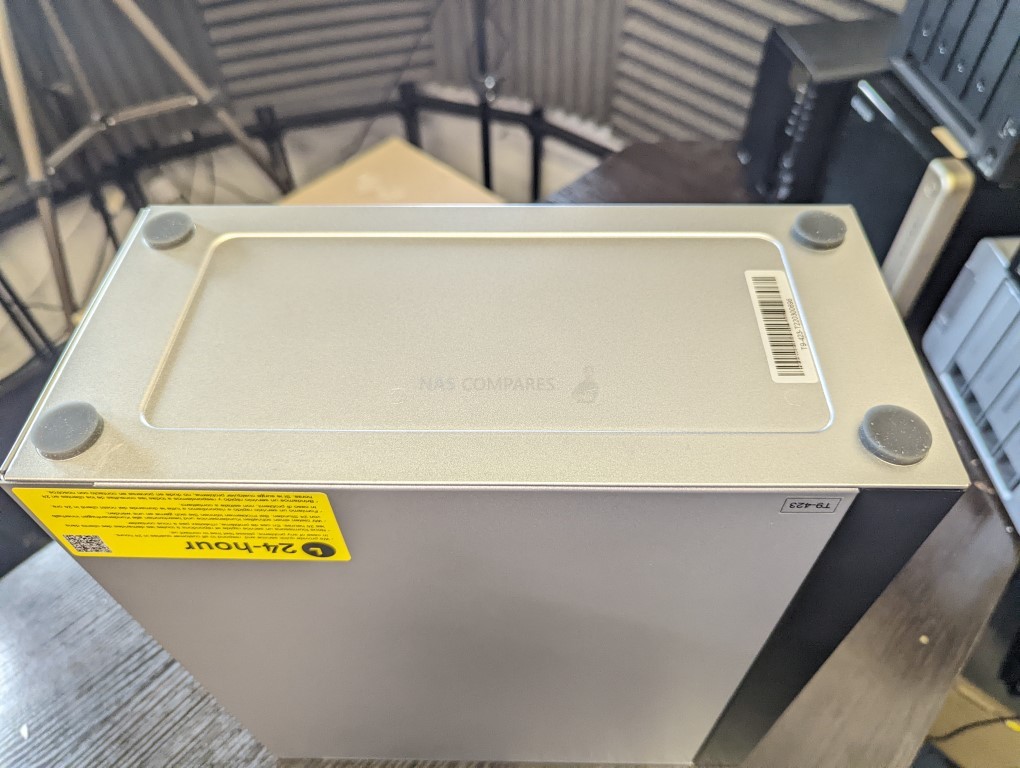
Well, yes, sort of. Inside the accessories kit you find a pack of additional rubber feet and although there is ZERO mention of this being so you can deploy the Terramaster T9-423 NAS in a horizontal fashion, it is not particularly hard to do so and these will ensure that the side of the chassis with all those HDD ventilation is raised up from the desk (much like it is with most other desktop NAS).
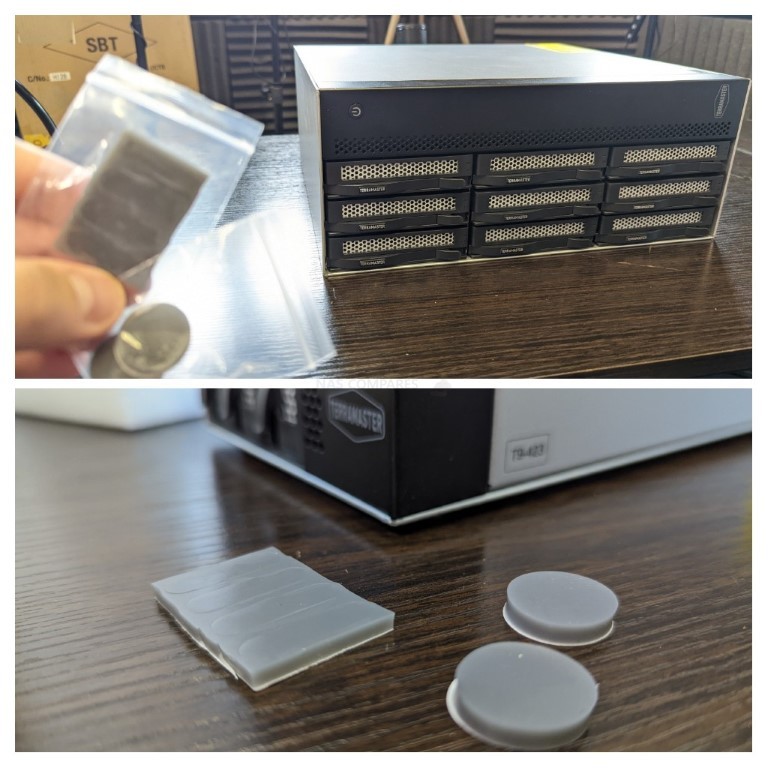
When it is on its side, it looks surprisingly neat Again, very much like a compact rackmount chassis and I can DEFINITELY see some users opting for this style of deployment of the Terramaster T9-423 NAS. The only issue I can foresee here is that the network ports will be at a 90-degree angle (hardly the end of the world).
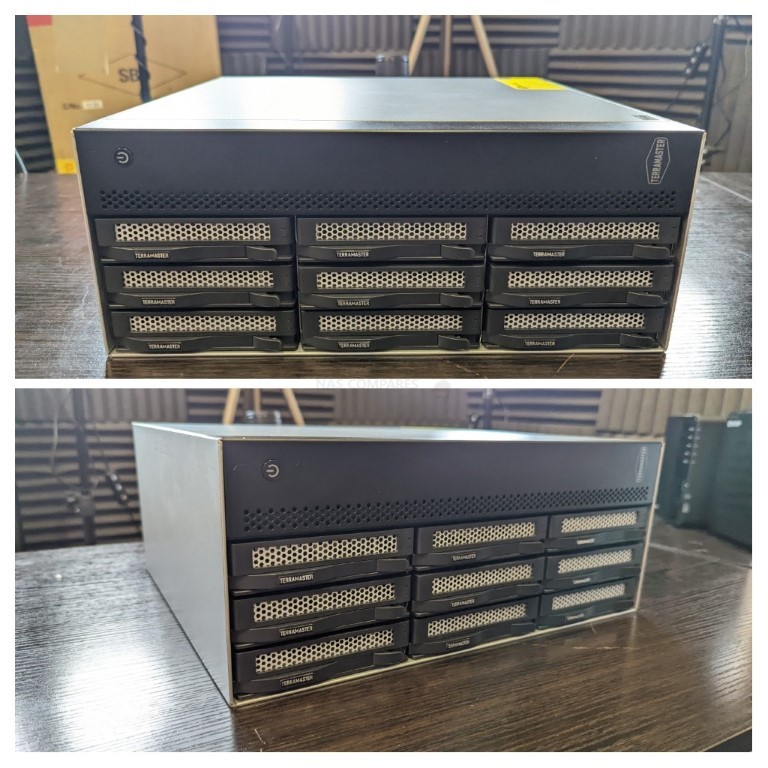
Overall, I have to say that the design and build quality of the Terramaster T9-423 NAS was considerably higher than I thought it would be and I very quickly grew accustomed to the unusual design and saw its merits. Additionally, the build quality here is considerably higher than other smaller Terramaster desktop NAS chassis. Let’s discuss the ports and connections of the Terramaster T9-423 NAS to see if this NAS continues to impress.
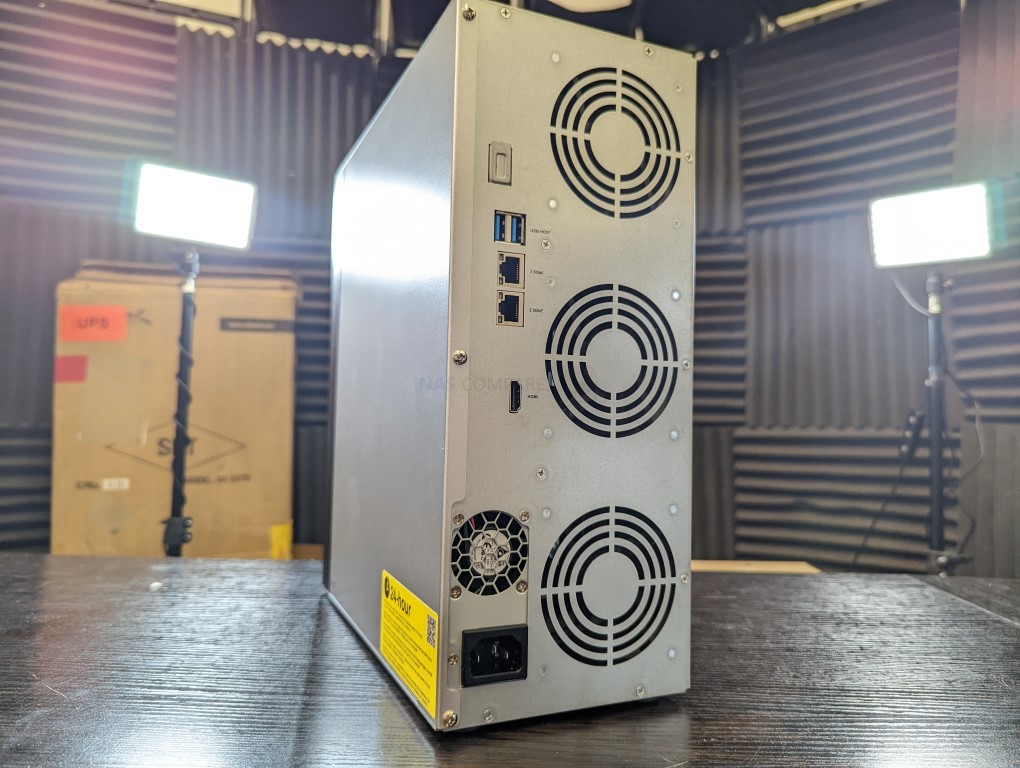
Terramaster T9-423 NAS Review – Ports and Connections
The rear of the Terramaster T9-423 NAS is a little sparse, but what you have here is (for the most part) pretty darn good for 2022. The system features an internal 250W PSU that Terramaster state, when the system was fully populated with Seagate Ironwolf 4TBs) consumed 72/29W active/idle respectively. Inside the Terramaster T9-423, you find that the PSU is a stock (i.e not customized or bare) power supplier and neatly installed with all cabling readily tied.
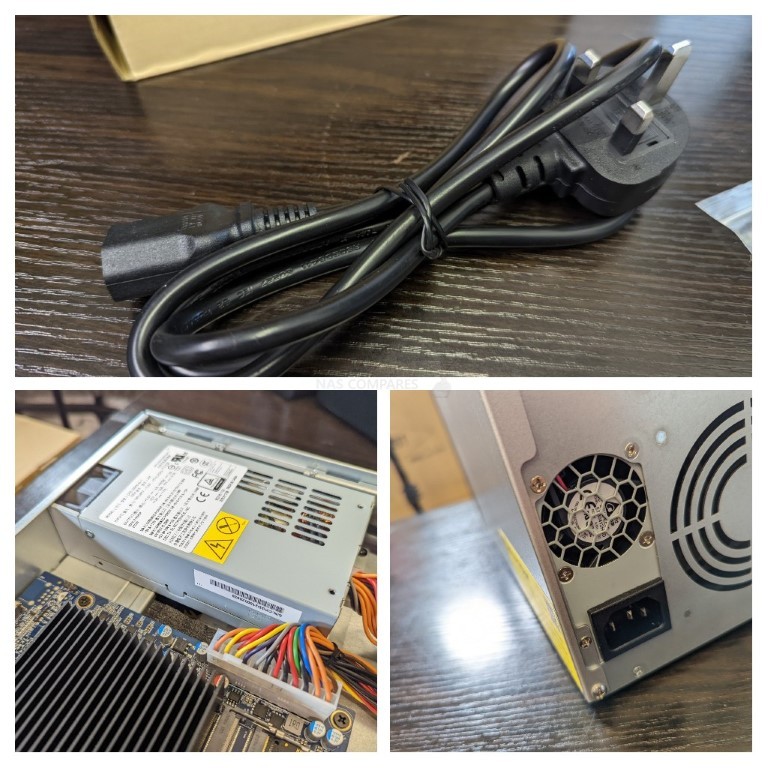 Of course, the first big improvement of the Terramaster T9-423 and x423 series has over its predecessors in the brand’s desktop portfolio in recent years (F4-422 and F5-422) is the inclusion of 2.5-gigabit ethernet (2.5GbE). The NAS arrives with two ethernet ports that can provide around 250-279MB/s throughout each, as well as allowing link aggregation (aka Port Trunking) to combine their bandwidth and provide 5GbE (around 500-550MB/s throughput) with the use of a smart switch. In the last few years, we have seen several brands provide 2.5GbE connections at the same cost as 1GbE ports and with internet service providers and affordable switch manufacturers providing 2.5GbE solutions, it was only natural that NAS brands would make the jump towards it. Hypothetically, if you had a faster than Gb internet connection (fiber etc) and a google drive account, that means that you would be able to connect with your cloud drive FASTER than a NAS system in your home if you only have 1GbE. This is why NAS systems need to arrive with 2.5/5/10GbE in 2022, for the sake of futureproofing and to keep up with the growing demands for data access. Additionally, 9x SATA storage bays (as well as the internal SSD bay that I will touch on later) will easily saturate a 2.5GbE and even LAG-supported 5GbE connection, so these ports allow you to maximize your storage potential and share that bandwidth with multiple connected users.
Of course, the first big improvement of the Terramaster T9-423 and x423 series has over its predecessors in the brand’s desktop portfolio in recent years (F4-422 and F5-422) is the inclusion of 2.5-gigabit ethernet (2.5GbE). The NAS arrives with two ethernet ports that can provide around 250-279MB/s throughout each, as well as allowing link aggregation (aka Port Trunking) to combine their bandwidth and provide 5GbE (around 500-550MB/s throughput) with the use of a smart switch. In the last few years, we have seen several brands provide 2.5GbE connections at the same cost as 1GbE ports and with internet service providers and affordable switch manufacturers providing 2.5GbE solutions, it was only natural that NAS brands would make the jump towards it. Hypothetically, if you had a faster than Gb internet connection (fiber etc) and a google drive account, that means that you would be able to connect with your cloud drive FASTER than a NAS system in your home if you only have 1GbE. This is why NAS systems need to arrive with 2.5/5/10GbE in 2022, for the sake of futureproofing and to keep up with the growing demands for data access. Additionally, 9x SATA storage bays (as well as the internal SSD bay that I will touch on later) will easily saturate a 2.5GbE and even LAG-supported 5GbE connection, so these ports allow you to maximize your storage potential and share that bandwidth with multiple connected users.
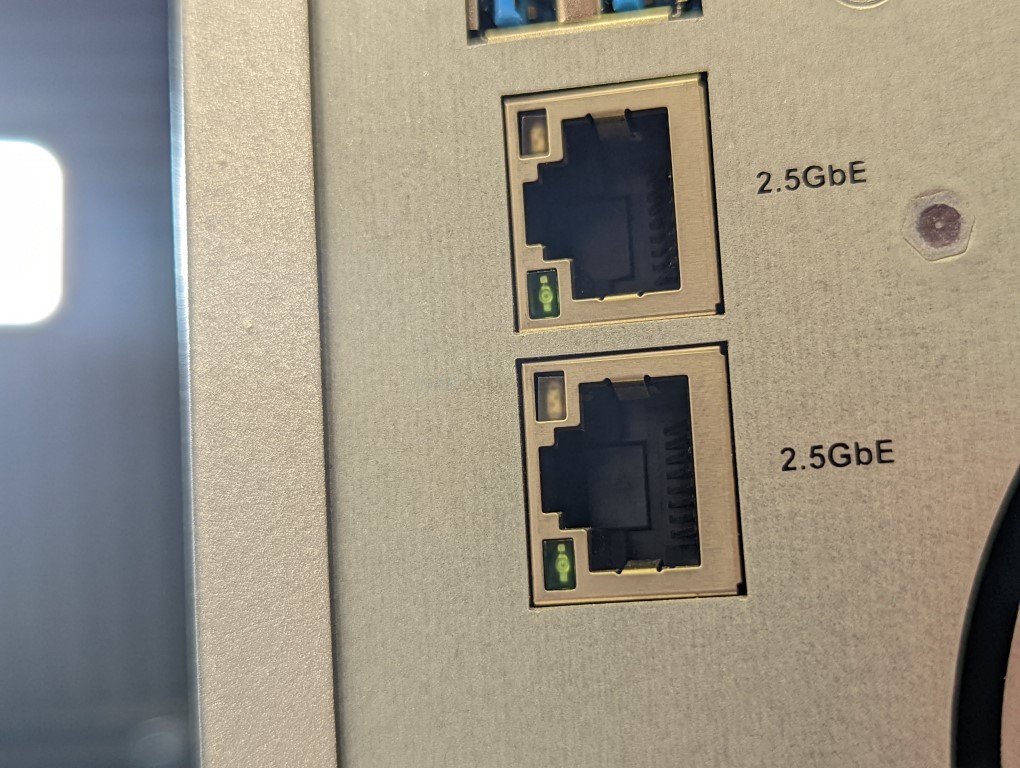
One slight letdown is that the Terramaster T9-423 arrives with an HDMI port BUT they do not have any kind of HDMI/Visual GUI that can be accessed (unlike QNAP’s HD Station and Asustor’s Portal applications) The HDMI out DOES allow you to access SSH/Telnet level/stylized backend controls with a USB keyboard, but with this CPU and hardware architecture supporting embedded graphics, 4K media and multimedia services, it is a real shame that you cannot do anything more home/SMB friendly than command line. Maybe one-day Terramaster will update TOS to take advantage of this feature in a more graphical/KVM way, but it has been 2 years of these systems having HDMI and we have yet to see any change on this.
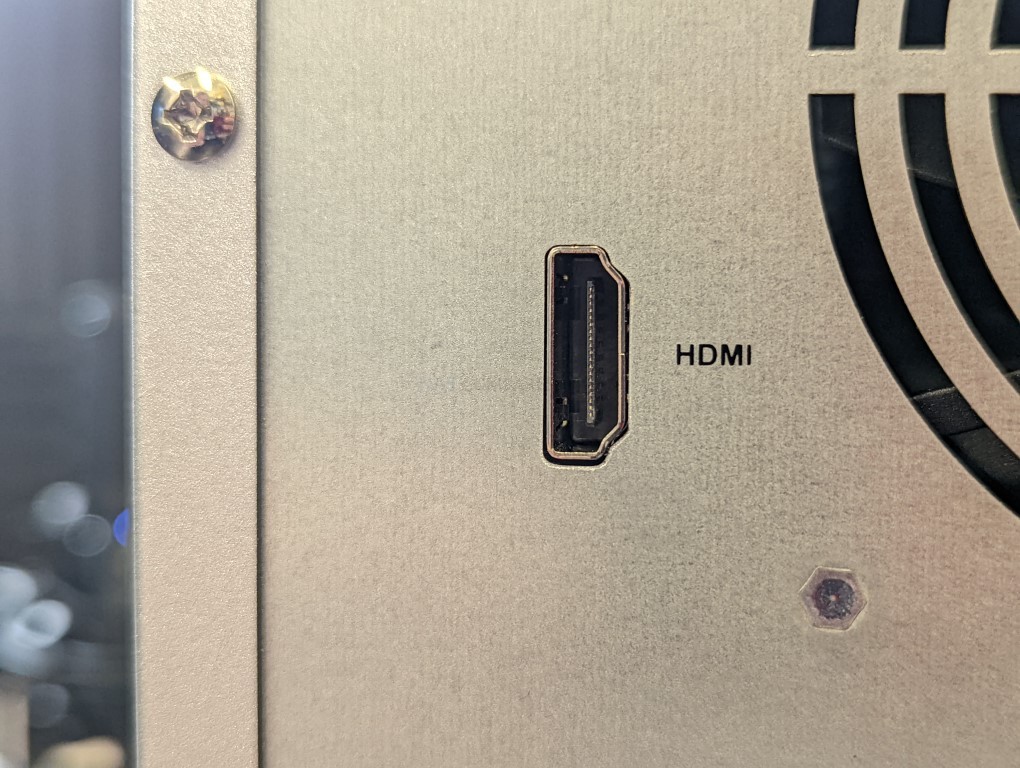
The USB ports of the Terramaster T9-423 are a subtle upgrade over previous/older NAS systems from the brand, with this NAS featuring 2x USB 3.2 Gen 2 Type-A ports. These allow connections of up to 10Gb/s (1,000MB/s – double that of the USB 3.2 Gen 1 5Gb/s in older systems) and that means much, MUCH faster local backups to external storage drives, as well as the support of USB JBOD storage expansions. The real benefits of USB 3.2 Gen 2 in expansions are only really felt when using larger SSD arrays or 5-8 bay expansions. Nevertheless, these ports are a nice extra for the system. Additionally, Terramaster recently released an affordable USB-to-2.5GbE adapter for £25+ that allows you to connect ANOTHER 2.5GbE port on this system. Add a 2-4-8 Bay storage expansion to the other USB port and you have a great deal of storage and network bandwidth for this system to graduate towards, all thanks to those newer gen USB ports.
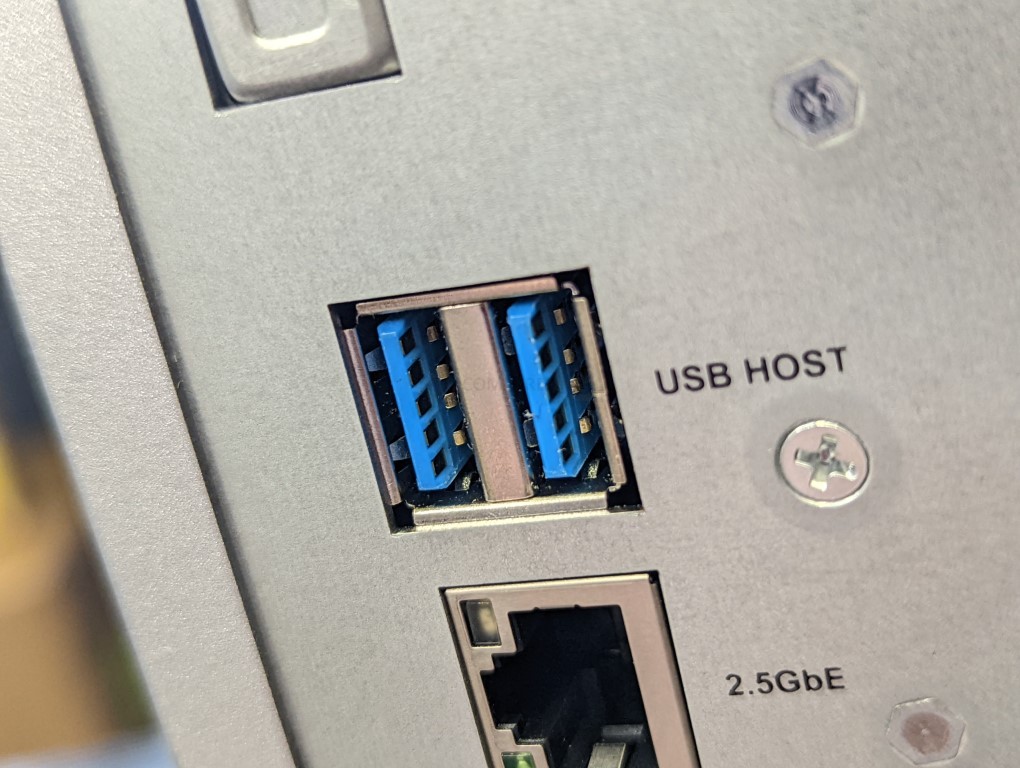
The ports and connections of the Terramaster T9-423 are few in number but still nonetheless good upgrades over it’s predecessor. Terramaster could have EASILY cut a few corners here (i.e USB 3.2 Gen 1 or just a single 2.5GbE port) and most users would not have batted an eye (as it is noticeably lower in price than the similar USB 3.2/2.5G QNAP TS-873A). Let’s get our screwdriver and take a look inside this NAS to see how Terramster have approached the internal specifications of the T9-423.
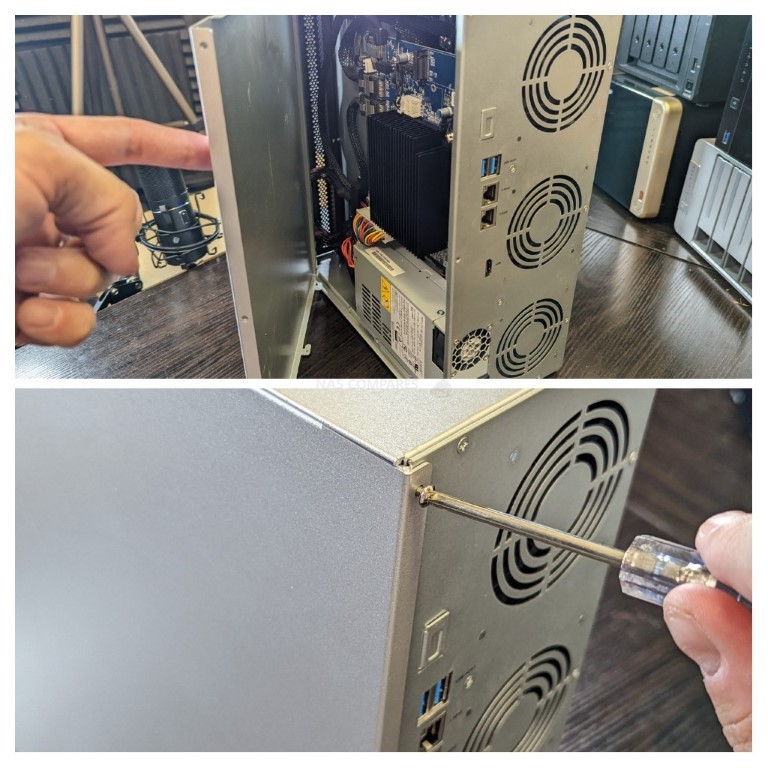
Terramaster T9-423 NAS Review – Internal Hardware
As mentioned earlier, the internal layout of the components in the Terramaster T9-423 NAS is surprisingly petite and has a nice, clean setup. The controller board takes up less than 50% of this compartment of the case and the only wires on show are those from the PSU and those storage multilane cables that are feeding into the main board. Despite the modest Celeron CPU inside the Terramaster T9-423, the heatsink that has been applied to it is pretty massive!
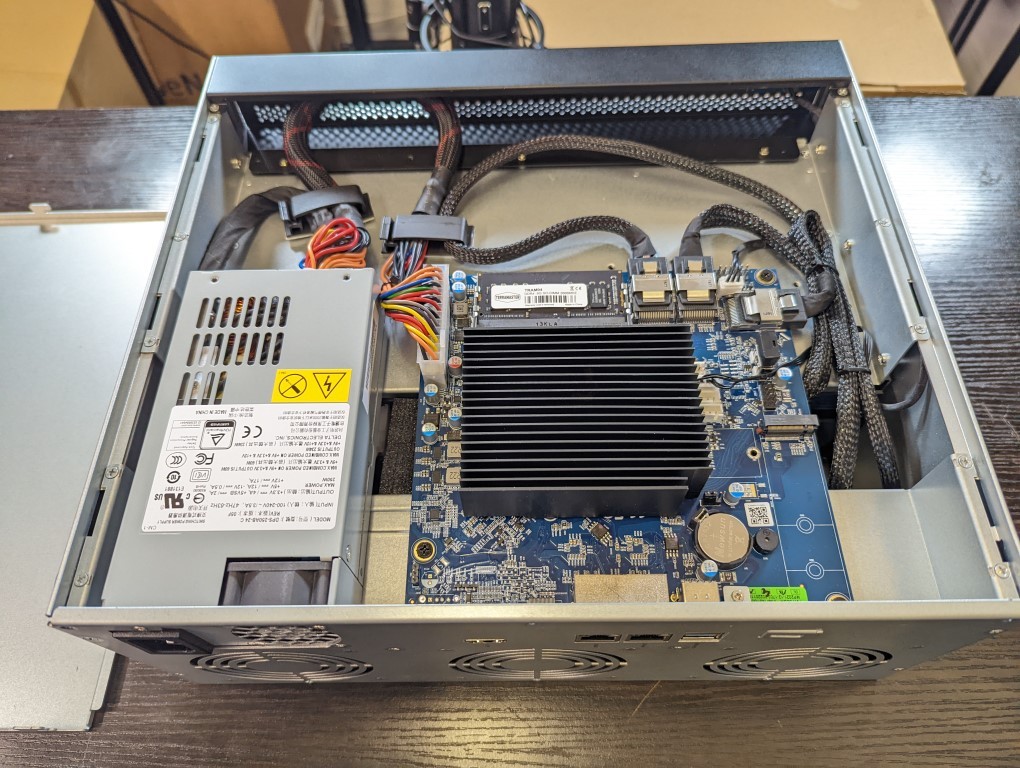
Most other NAS systems that are built using this generation of Celeron processor have heatsinks around a quarter of the size of the one in the Terramaster T9-423 NAS. Sadly, it cannot be easily removed (I didn’t want to undermine/harm later testing either) but I would be interested in seeing just how many components are under that heatsink – as even if this is a 9 bay NAS, that’s ALOT of heat dissipation potential that I doubt this CPU is ever going to need. Still, better to have it than not!
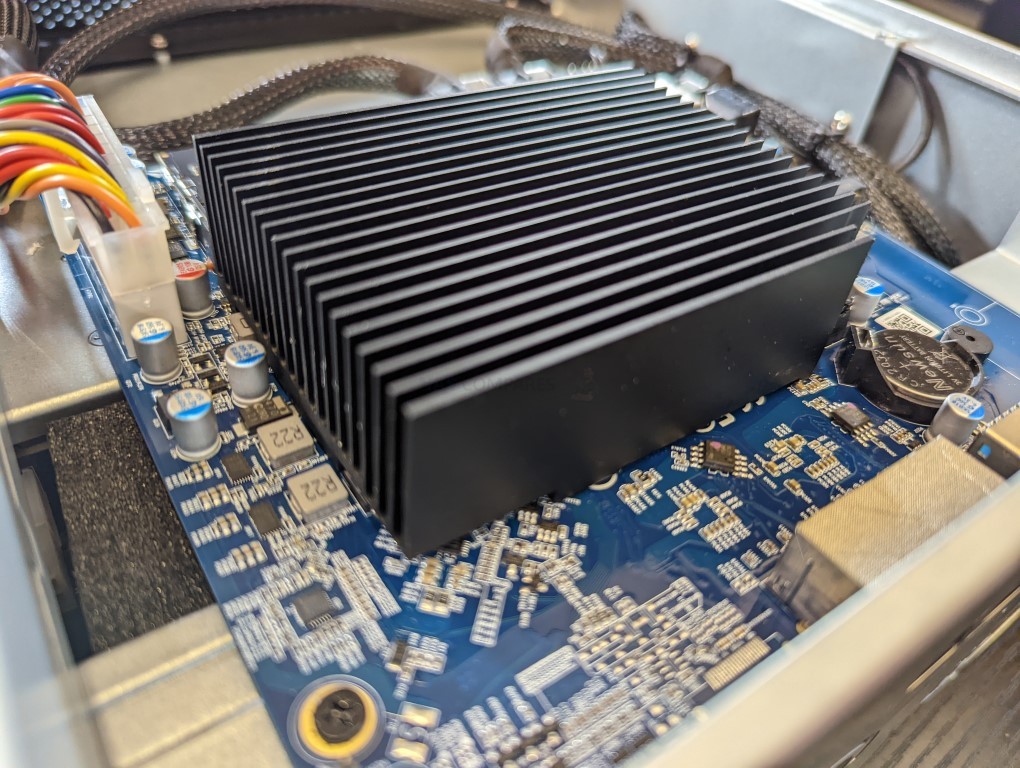
The CPU featured in the Terramaster T9-423 NAS is a quad-core Intel Celeron N5105 CPU, a processor that has been very much the ‘CPU of choice’ among the 2022/2023 generation of NAS hardware from most of the brands (except Synology). This is a quad-core x86 64bit processor that is 2.0Ghz in clock speed, that can be burst up to 2.9Ghz when needed. It features an onboard AES-NI encryption engine, as well as Intel embedded graphics for visual data tasks such as native multimedia playback, transcoding, photo management and improved services in TOS 5 (still in beta) towards AI photo recognition and surveillance with IP Cameras. As mentioned, although this is never going to challenge the likes of an Intel Pentium or Intel Core in 2022, it is still a very good CPU and in the context of NAS and this price point, very competent indeed.
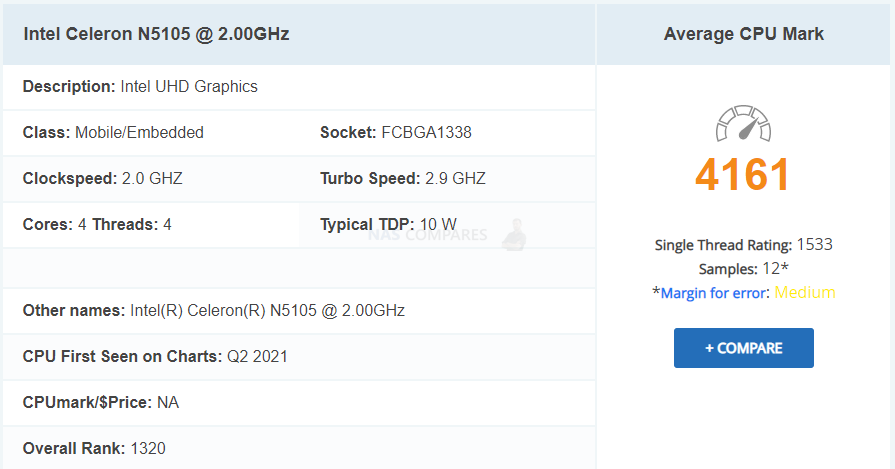
Alongside that CPU, the Terramaster T9-423 NAS also arrives with 8GB of DDR4 Memory (twice the amount of most other systems of this scale and others in the x423 series). However, closer inspection of the T9-423 architecture does raise a small question. Firstly, the 8GB of memory the system arrives with is a single 8GB 26666Mhz SODIMM module, which is great as this is double what most other brands would include in this storage tier + price point. However, Terramaster state that the T9-423 NAS supports up to 32GB of DDR4 SODIMM memory across its two slots. However, Intel state that this CPU only supports a maximum 16GB across two channels – so although I am sure the system would definitely see 32GB of memory if you have 2x 16GB installed, I do wonder if you will definitely be able to actually USE all 32 correctly.
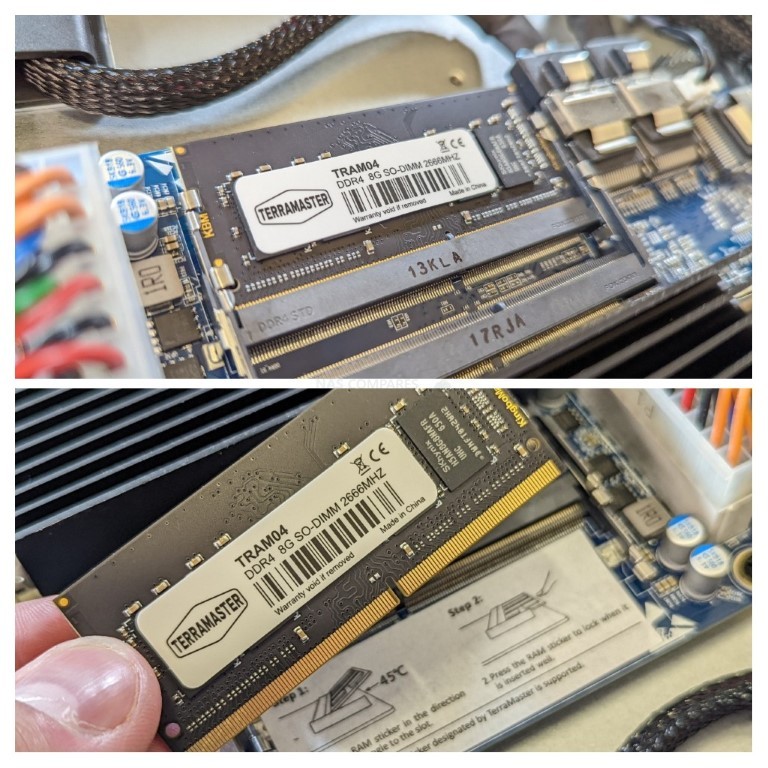
The Terramaster T9-423 also features a single M.2 NVMe SSD bay that allows you to install significantly faster SSDs into the system alongside SATA HDDs, meaning that you have another option for your storage. Now, there is good and bad news here regarding this port. On the plus side, it can be used for either caching alongside the larger HDD RAID configuration (to allow read-only caching and improve their performance in key areas) or as its own storage pool. This is something that popular NAS competitor Synology has never implemented to their NVMe bays, despite it being a highly requested feature. On a slight downside, as the Intel N5105 CPU inside the Terramaster T9-423 is already being stretched a little thing in it’s architecture, the M.2 NVMe SSD bay is PCIe Gen 3 x2 speed. This means that NVMe SSDs such as the Seagate Ironwolf 510/525 or WD Red SN700 at PCIe Gen 3/4 x4 will be limited down to a maximum 2,000MB/s transfer speeds. This is still something you can incorporate into a solid RAID for improved performance and its better to have them, than not at all though. Additionally, only having a single SSD M.2 slot means that read+write-caching is not going to be possible.
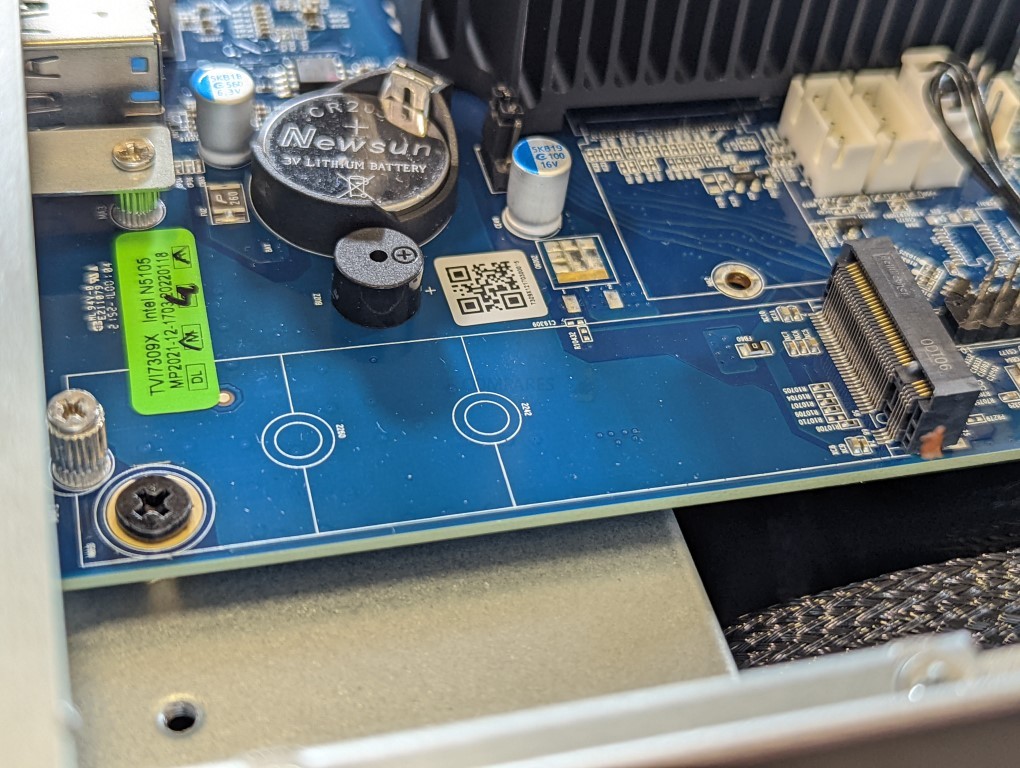
The internal hardware inside the Terramaster T9-423 is still good for the money and certainly gives you a solid base level of hardware to work with. The means to access and upgrade the system hardware is less smooth than most/all other commercial NAS brands, but once you have jumped these odd hurdles, you have some great kit here to use in conjunction with 1st and 3rd-party applications. One nagging point for me is that the system COULD have used the onboard lanes that they used on the M.2 NVMe bay (Single slot at PCIe Gen 3×2) instead towards a PCIe upgrade slot. Then users could have made their own choice between an SSD caching upgrade card OR opting for 10GbE. Let’s move into the subject of software and TOS on the T9-423.
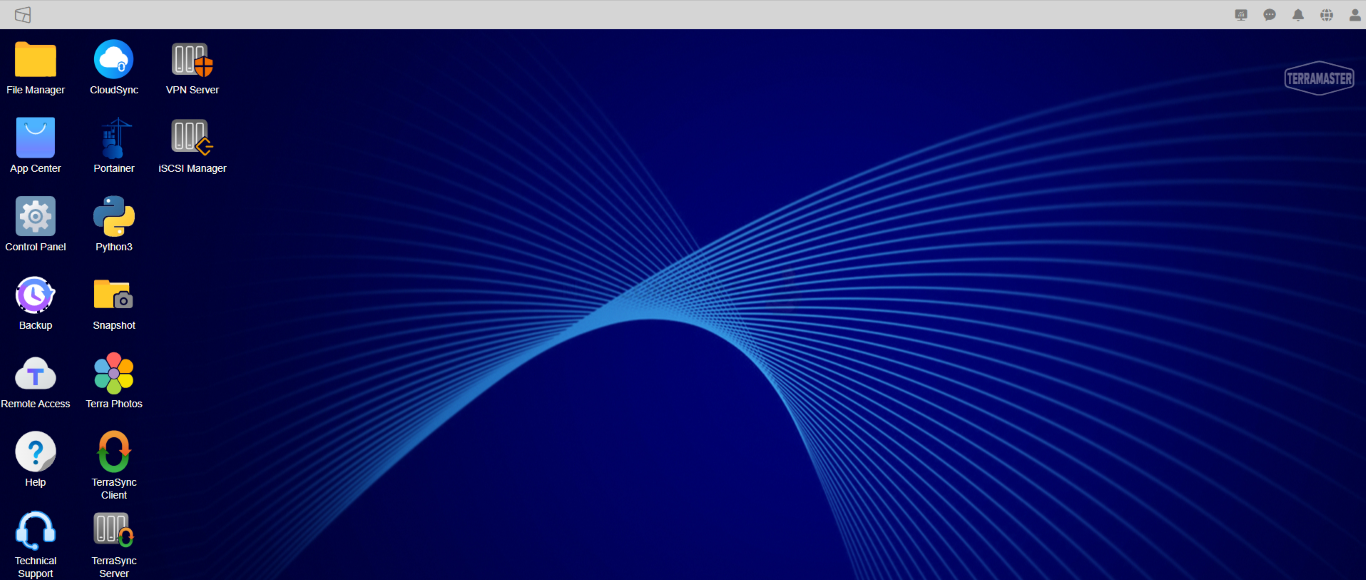
Terramaster T9-423 NAS Review – Software
VERY IMPORTANT – At the time of writing this review, the Terramaster T9-423 NAS arrives with the 4th generation of their software platform TOS. Why is this important? Well, because right now the brand has RELEASED TOS 5 and it is a SIGNIFICANT step from the current generation of TOS that is included with the majority of Terrmaster NAS systems at launch currently. So, if you are considering the T9-423 NAS later in 2022/2023, then there is every chance that TOS 5 will be on your NAS and/or you can download it (free etc) onto the device. We will be reviewing TOS 5 fully in the next week, but for now, I wanted to highlight a number of the key features that will be added to TOS later this year, as well as the current range of services that are included in TOS 4 right now. (important, we originally previewed a VERY earlier build of Terramaster TOS 5 Alpha in the video HERE on the NASCompares YouTube channel which will give you an idea of how TOS5 looks/feels, but many new features have been added in the months since the beta was rolled out). LOADS more features have been added since this original alpha preview and we will soon be deep-diving into this newer Beta release very soon. Below is what Terramaster say is included in the new TOS 5 at launch:
New Features & Improvements in Existing Services
In TOS 5, not only have the storage structure and data interaction mode been reconstructed but also, compared with the previous generation, it adds more than 50 features and 600 improvements. The new features meet more business requirements, as well as significantly improve response speed, security, and ease of use.
Browser Access to TOS is Now 3x Times Faster
TOS 5 adopts progressive JavaScript language and a lightweight framework with a faster loading speed. TOS 5 features bidirectional data binding, easier data manipulation, and automatic synchronous response to data changes in the page; UI, data, and structure separation make it easier to change data without the need to modify logic codes. Using progressive JavaScript language, TOS 5 has a more lightweight framework. In addition, through two-way binding of data, the view, data and structure are separated. When the page is operated, it automatically responds to changes in data, which makes the system “lighter” and achieves a faster loading speed.
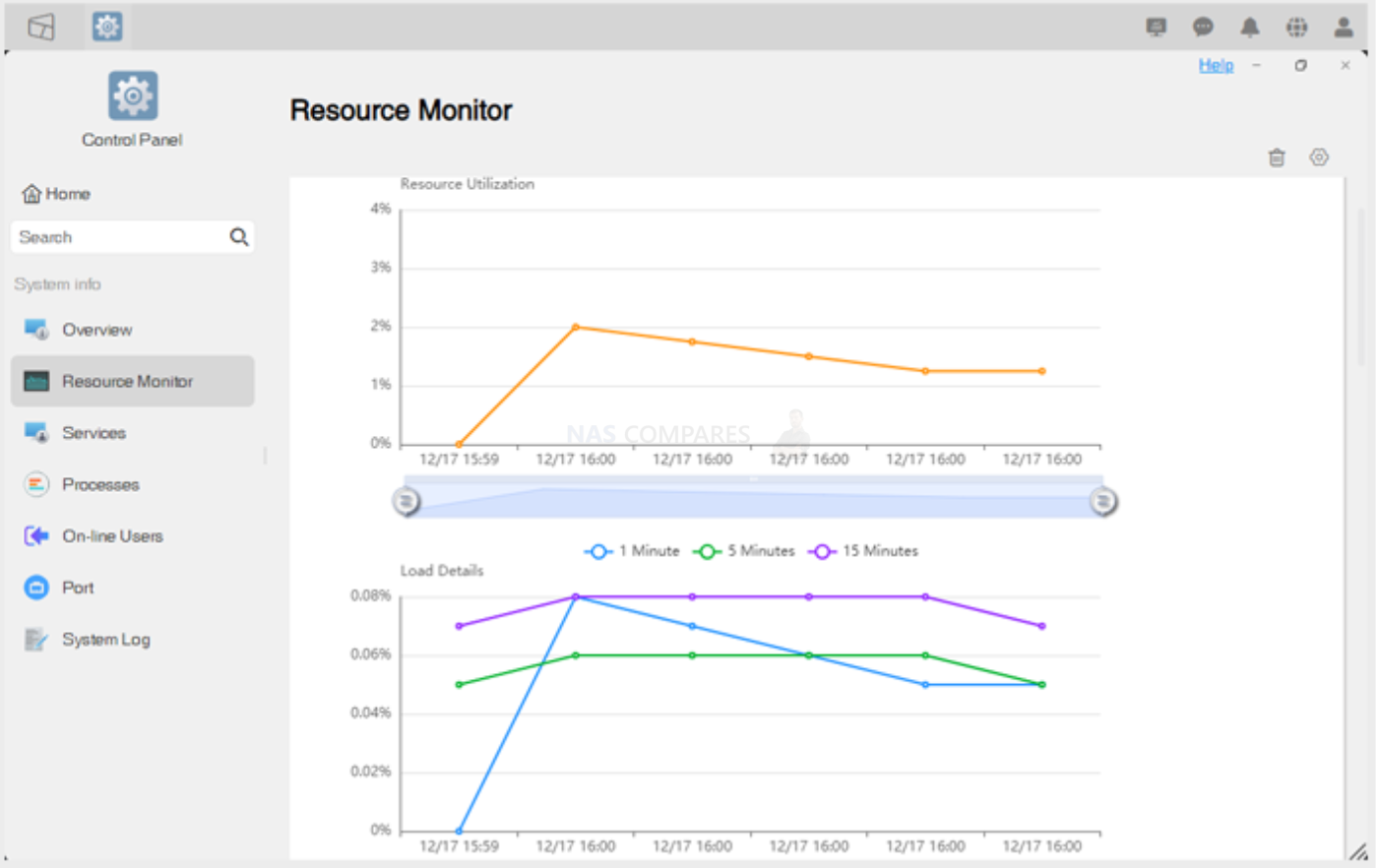
New caching technology avoids network round trips between the server and the database, bypasses the calculation that occupies resources, saves server resources, and improves response time and waiting time, so TOS 5 has the fastest response time in the current TOS family. Compared with the last generation, the TOS 5 response speed has increased by 300%! Use WASM to optimize the calculation method and execute the back-end complex calculations on the front-end, thereby reducing the calculation pressure on the server. In addition, TOS 5 uses the most popular back-end language at the moment, which can support high concurrent requests. Compared with traditional interpreted languages, the compilation speed is faster.
Improved Resource Monitor in TOS 5
The new iconic resource monitor board allows you to grasp the operating status of your TNAS comprehensively and intuitively in real-time; at-a-glance visibility of system load, CPU and memory usage, network traffic, disk I/O, device temperature, storage, processes, online users, listening ports, and system resource occupancy. Historical records of up to 30 days can be easily traced back.
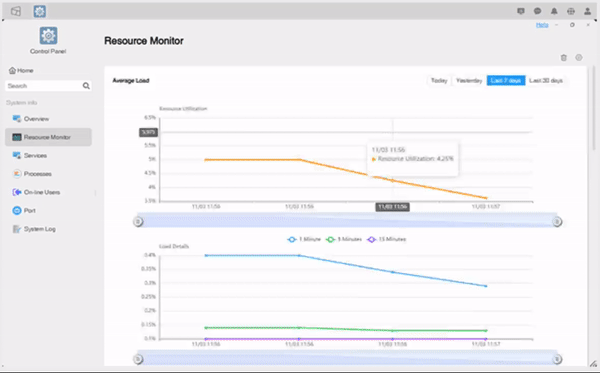
Full One Button System Isolation Mode Available in TOS 5
TerraMaster’s unique security isolation mode completely isolates your TNAS device from the external network through network isolation, digital signature, and file format restriction, providing a safer operating environment and effective protection against virus and ransomware attacks.
Support of the WORM File System in TOS5
Data can be written at one time within the customized protection period and cannot be deleted or modified. This effectively protects your data from malicious damage, deletion, or tampering and provides data protection for up to 70 years; essential for the financial, judicial, medical, and scientific research sectors, as well as other business users.
Improved Storage, Backup & Sync Features in Terramaster TOS 5
TOS 5 features optimized storage architecture to reduce the system space occupation. The file deduplication system, file system compression, TRAID elastic array, and other functions also save you up to 40% of storage space
Single Portal Folder Level Backup for Home and SMB Users
Reduce complexity and embrace simplicity. All backup needs can be completed through a single portal, providing one-stop backup solutions including Central Backup, TerraSync, Duple Backup, Snapshot, USB Copy, CloudSync, and other comprehensive backup tools. This meets your clients’ disaster recovery and restoration requirements, as well as backup policies and destinations.
Business Focused ProActive Backups for Larger Business
To improve management efficiency, medium and larger-sized businesses need a centralized and active backup solution for multiple users, PCs, and servers. Centralized Backup is a business-oriented backup solution that supports backup and restoration for multiple device types. You can centrally backup data of dozens or even hundreds of PCs, servers, or virtual machines with only one TNAS.
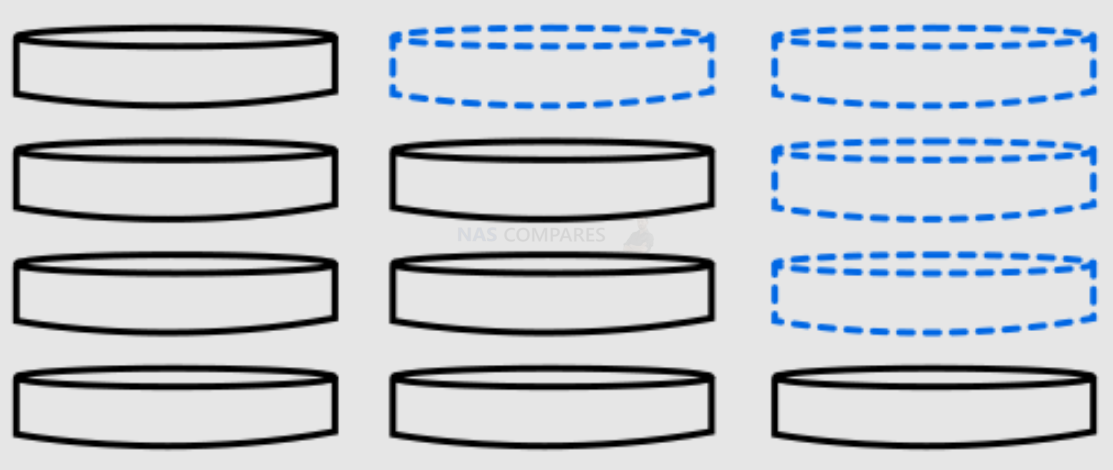
New Flexible RAID Support in TRAID in TOS 5
By optimizing the traditional RAID mode, TerraMaster RAID (TRAID) gives you flexible disk array configuration, flexible online migration, capacity expansion, and redundancy policies. As well as improving disk space utilization, it also provides solutions and security protection for storage space changes caused by new business requirements. Much like Synology Hybrid RAID (SHR) in that you can mix drive capacities for improved storage after the RAID redundancy calculation. I reached out to Terramaster directly on this and they confirm that this function is supported in TOS 5.
Multiple Client Sync with TerraSync in TOS 5
TerraSync, a TerraMaster self-developed synchronization tool, realizes data synchronization between multiple users and multiple devices. It efficiently implements data sharing among branch offices and data synchronization between individuals on multiple devices and platforms, which assists employees in collaborative work and improves work efficiency.
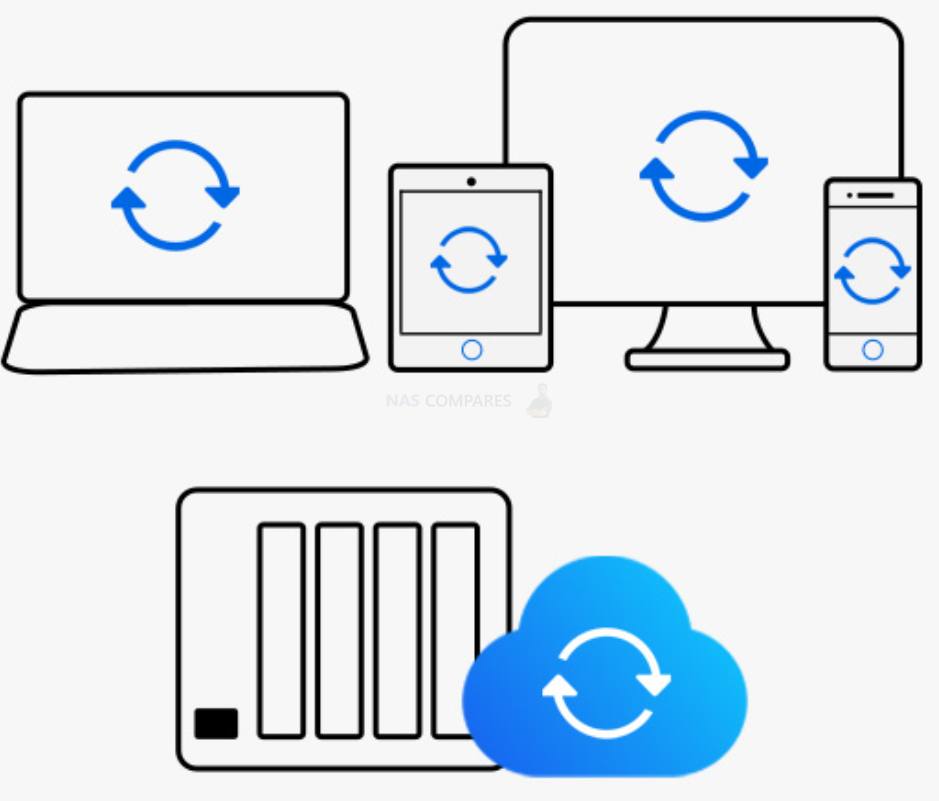
New CloudSync Application for Bare Metal-to-Cloud Live Sync in TOS 5
The new CloudSync app integrates multiple cloud drives and syncs them into one application, including Google Drive, One Drive, Amazon S3, Backblaze, Box, Dropbox, Koofr, OpenDrive, pCloud, Yandex disk, and Aliyun. This allows users to centralize the management of multiple synchronization tasks and add a variety of cloud disk synchronization options including Aliyun and Rackspace. A more flexible, stable, and efficient solution for data synchronization between your TNAS and cloud drives is facilitated by your choice of customized synchronization strategies, such as traffic control, scheduled tasks, and encryption.
CCTV Surveillance in Terramaster TOS 5
TNAS is an ideal video recording storage device. The new Surveillance Manager makes full use of TNAS storage resources to realize camera management, real-time monitoring, video storage, playback, query, event and activity monitoring and recording, providing you with economic and flexible video monitoring management tools to safeguard your personal and property safety.
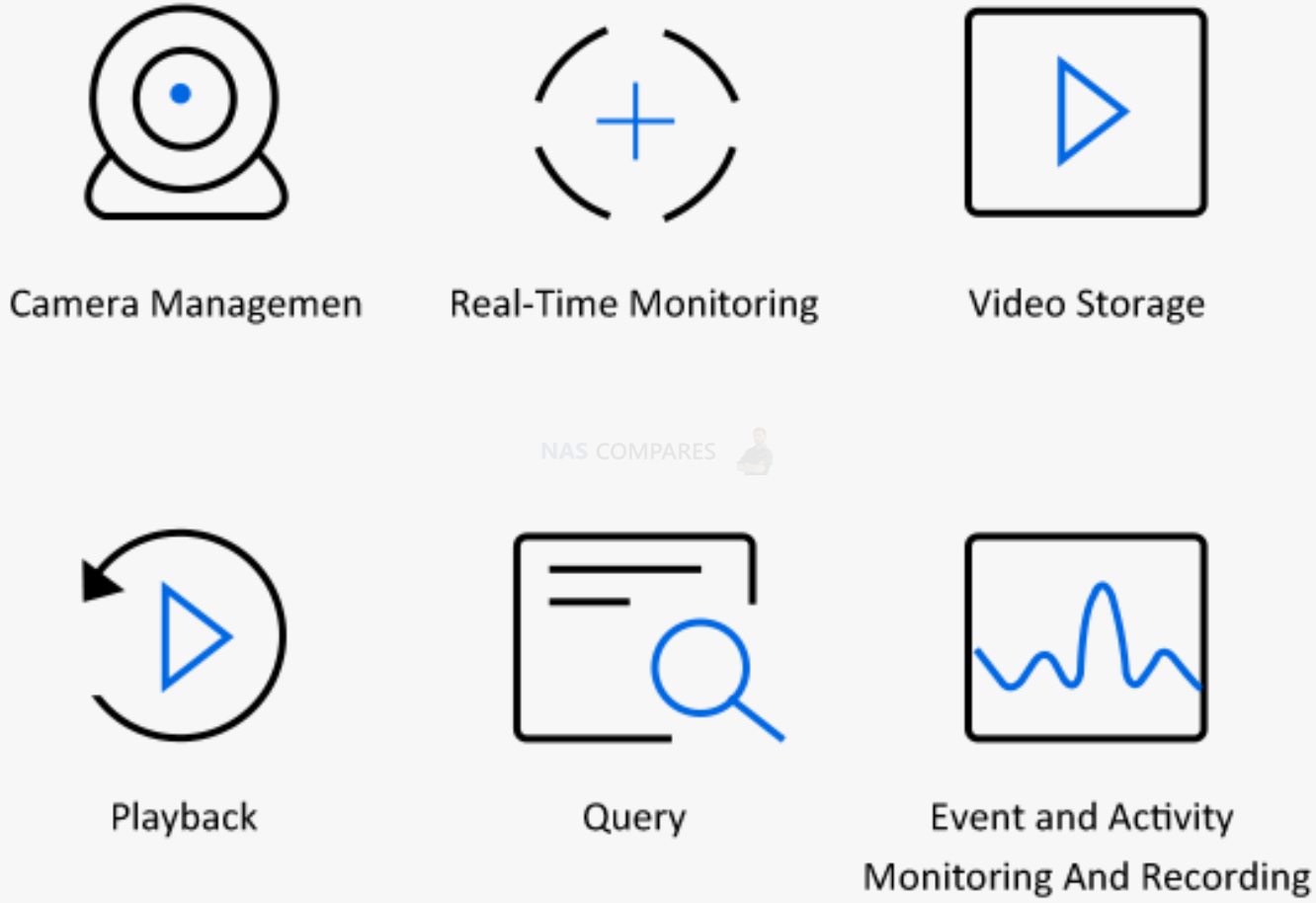
AI Photo Recognition Now Available in TOS 5 with Terra Photo
Terra Photos is TerraMaster’s brand-new AI photo management application that provides smart solutions for your photo management and sharing; it uses intelligent AI algorithms to identify and classify faces, pets, locations, and other objects in your photos.

Docker Added to Existing Container Tools in TOS 5
Combined with docker-compose and portainer, the new Docker Manager features an optimized operation interface, with multiple new features which provide visual management that meets all your requirements for container customization and flexible configuration.
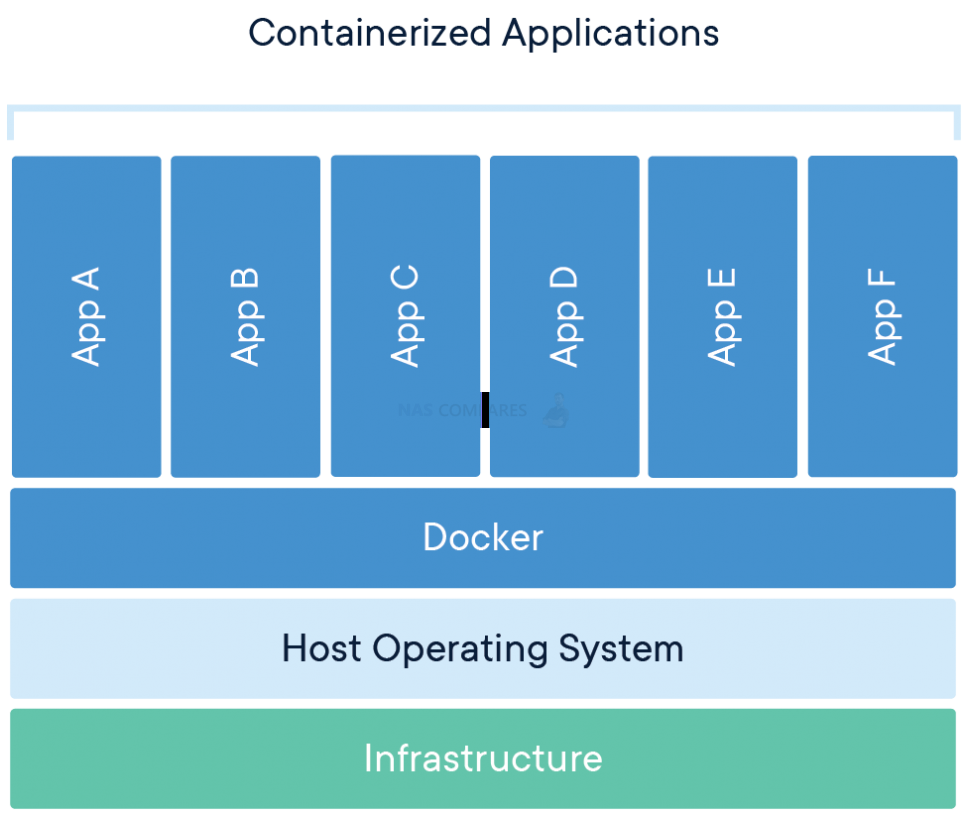
New Update to Terramaster’s Mobile App, TNAS Mobile 5
To adapt to TOS 5, TNAS mobile has also ushered in a comprehensive update, TNAS mobile 5. Featuring an optimized user interface and interaction, it has also added mobile phone backup, photo management, personal folders, team folders, data safebox, TerraSync, remote administrator, and other functions, which provide more convenience for remote access, mobile office, and remote management of your TNAS.
TOS 4 on the Terramaster F4-422 NAS
Once again, I need to highlight that the T9-423 NAS needs to be viewed with its price tag always in mind. With software and hardware that is available on other NAS brand devices, it is easy to imagine that this device is a much, more affordable alternative to QNAP or Synology NAS. However, you should always remember that this device is still aimed at those looking for a first dip into NAS and if should be compared with WD NAS and D-Link when making your choice of NAS. it is DEFINITELY better than those and arrives at a better price, but it may still be a year or more before the Terramaster TOS Software platform can compete with DSM and QTS. That said, the Beta is really showing that TOS is going to evolve even further and for more information about the TerraMaster TOS operating System, I recommend visiting my software review here from a couple of years ago.
Key Software and NAS tasks that are supported are:
- RAID 0, 1, 5, 6, 10, JBOD
- Apple Time Machine Backup
- Cloud Migration and Synchronization
- NAS to NAS Rsync Support
- Plex Media Server
- Docker
- Mail Server
- Web Server
- DLNA Media Server
- WordPress Server
- Download Server
- Snapshot Support
With a good range of applications to choose from, as well as the support of modern NAS applications in the mix, the TerraMaster T9-423 does give you a good base with which to start your NAS journey, though it may feel a little streamlined for those with greater NAS experience.
Terramaster T9-423 NAS Review – Conclusion
I like the terramaster T9-423 NAS a lot more than I thought I was going to! Over the years I have seen several quirky NAS designs appear from brands looking to find gaps in the existing market between the traditional 2-bay, 4-bay, 8-bay and rackmount systems. In most cases, these brands tend to never really hit the ground running with these systems and a lot of that is because they are either priced poorly, have bad internal hardware choices for the sake of offsetting the overall cost of a new design or simply do not read the room in knowing what people want. I’m pleased to say that the Terramaster T9-423 does not seem to suffer any of these things. This 9-Bay arrives in a chassis that is a smaller and more convenient frame than many eight-bay desktops, arrives at a price point that for the scale is reasonable and has the same or better hardware than most other mid-range desktop NAS in 2022. Alongside this, Terramaster’s innovations in TOS5 to improve their platform to include many more storage services, backup methods and a few premium apps in the works means that the brand still manages to be competitive in spite of its more cost-effective reputation and hardware focus. First-party app development still pales in comparison to bigger NAS brands (though popular third-party tools that already exist in the market are supported and available to download) and in terms of software, this system is still a little underwhelming, if very functional. Then you have the build quality. The construction of this chassis is particularly higher than I anticipated and unlike many of the brand’s rather dated or plastic-looking cases in 2 and 4 bays, The T9-423 is remarkably well constructed with excellent considerations being made to ventilation and keeping the device compact despite its large storage potential. As long as you keep in mind that you are buying a more cost-effective or value alternative to top-tier brands, as well as having perhaps a little more patience with the software than you might like, the Terramaster T9-423 is a great NAS and an exceedingly positive move by the brand to further evolve.
| PROS of the Terramaster T9-423 | CONS of the Terramaster T9-423 |
|
|
Click the link below to take you to your local Amazon store and where to buy the terramaster T9-423 NAS.
Do You NEED 5GbE NAS? (Or Should You Skip Ahead to 10GbE)
UGREEN DXP4800 PRO NAS Review
Minisforum G7 Pro Review
CAN YOU TRUST UNIFI REVIEWS? Let's Discuss Reviewing UniFi...
WHERE IS SYNOLOGY DSM 8? and DO YOU CARE? (RAID Room)
UniFi Routers vs OpenWRT DIY Routers - Which Should You Choose?
Access content via Patreon or KO-FI
Discover more from NAS Compares
Subscribe to get the latest posts sent to your email.


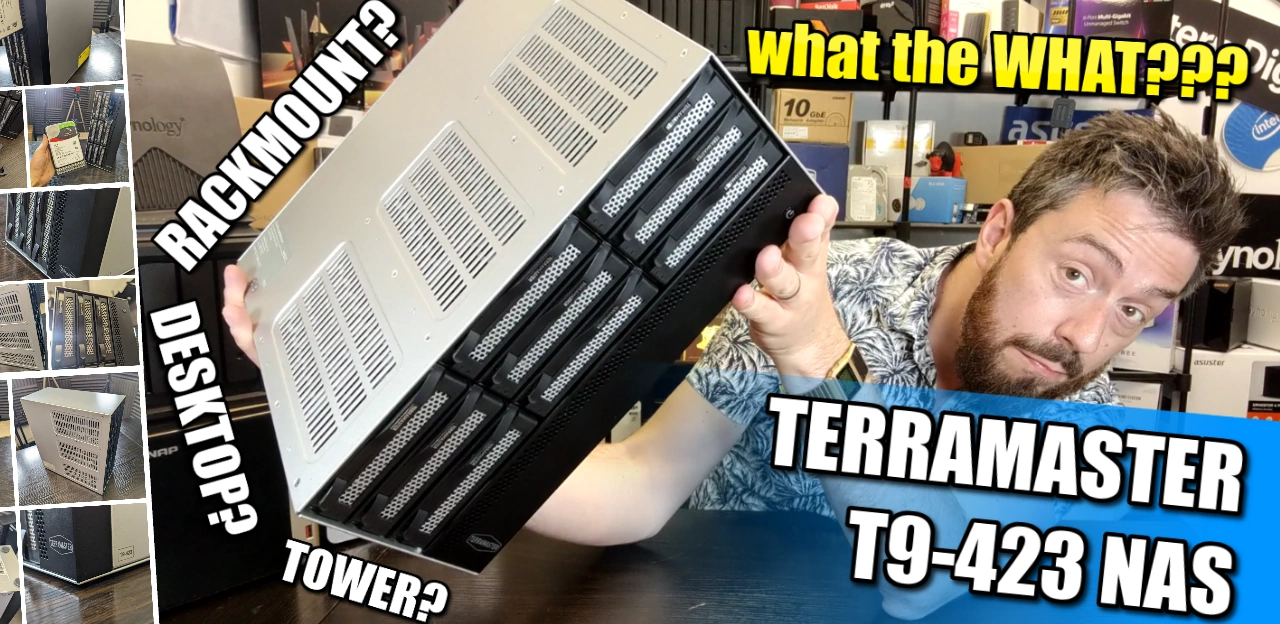
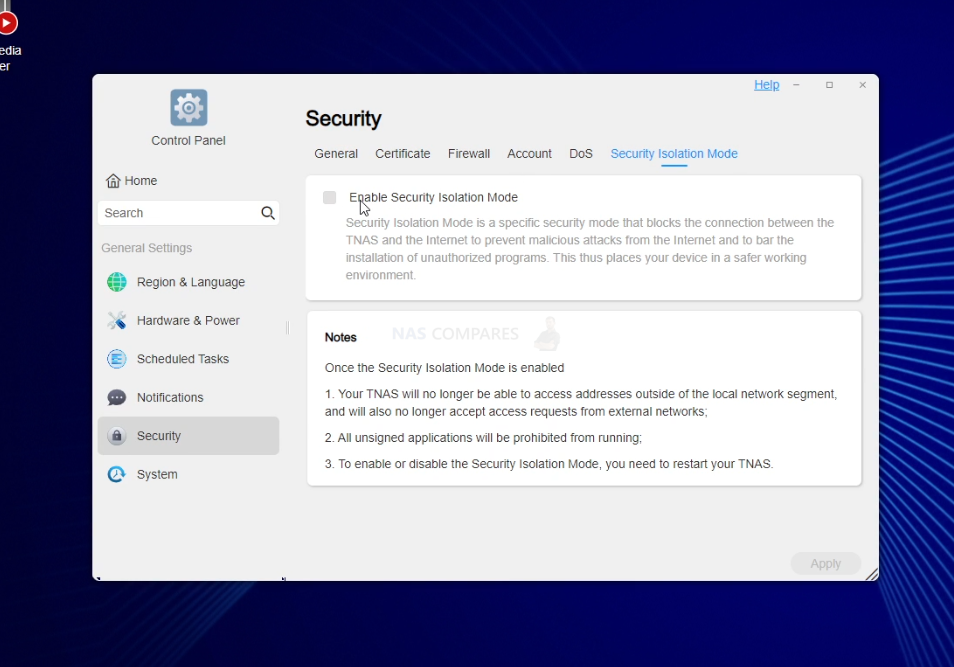



Look like a have a major problem I lost access to my nas , F2-210 2 drives I can not get into my system(TOS), I had the systems for a few years(3), I tried to shutdown system nothings happens, followed the steps from TM support web site no go. Now TNAS PC does work. I need a lot of HELP?
REPLY ON YOUTUBE
Whats the total power consumption?
REPLY ON YOUTUBE
Can I install Truenas on this model? Thanks!
REPLY ON YOUTUBE
I‘m looking forward to the T6-423 version. After watching a lot of videos and reading I went for Terramaster 🙂
REPLY ON YOUTUBE
Would be nice to see a review of the very interesting T6-423, 6 bays are for me a kind of sweet spot in price/storage.
REPLY ON YOUTUBE
From what I’ve read the vendor lock-in with the RAM is only in the TOS software. If you’re using any other OS with this system, you can use whatever compatible RAM modules you like.
REPLY ON YOUTUBE
Can’t find where to buy them.
REPLY ON YOUTUBE
Would you please do a performance test of such hardware raid comparing it to software raids like Synology SHR-1/2 since Synology always have a performance issue with SHR, so I wonder if this is no longer an issue with a hardware alternative
REPLY ON YOUTUBE
Why dont review Firewall pls?
REPLY ON YOUTUBE
Hey guys… If you guys dont want it standing up…. you can lay it down with vents down….. and put something under the NAS , in all 4 corners… taa-daa 🙂 vents-heating problem solved 🙂 hehe
REPLY ON YOUTUBE
Due to Synology HD issue and Qnap security issue, I have built my own custom NAS using unraid and I am impressed with this setup. SHR like flexibility with better hardware and upgrade options are possible just as these desktop NASes.
REPLY ON YOUTUBE
This ticks so many boxes for me (solid construction, like the metal HDD caddies/shell, hybrid RAID, 2.5gbe NICs, reasonable price and USB DOM which I assume you could install xpenology on? One big issue for me though…… NO PCIE slot for 10gbe or additional NVMe support. So close to being perfect for my use case. Credit goes to Terramaster for bringing some interesting designs to the market and not just another black box of plastic! Like yourself I’m quite impressed with what Terramaster are doing right now.
It’s also great you had a look inside this unit. I wonder if that PSU connector is proprietary or is it a standard 20/24 pin PSU connector? Would be good to know in case you had a PSU failure.
REPLY ON YOUTUBE
omg compared to synology they done everything right. It is unfortunate that they don’t have the synology software.
REPLY ON YOUTUBE
The ONLY ppl buying this crap are those who cannot afford Synology gear. That is the truth.
REPLY ON YOUTUBE
I’m really interested in the 12 bay version of this model. Normally I’d just go for the Synology, but the third party drive warnings would be infuriating on the Synology 12 bays.
REPLY ON YOUTUBE
This TerraMaster is right proper tickety-boo. Still, a grand is bracing. Too rich for my blood. This is rack mount NAS money so if I’m going to pay a thousand or more I’m buying a rack based NAS,
REPLY ON YOUTUBE
Great shell indeed. Looking forward to your exploration of other OS through the USB.
REPLY ON YOUTUBE
Running it’s upside down to see the TEMPS.
REPLY ON YOUTUBE
Alles sehr schön. Aber zuerst zusammen die Nummern 10 und 1. Eine sleepfriendd.Online Brünette und eine anderex Blondine. Es wäre unfair, wenn ich 4 wählen würde
REPLY ON YOUTUBE
Drobo DAS replacement options video coming?
REPLY ON YOUTUBE
Love how terramaster says go to TOS > Control Panel > General settings > Software update MY NAS IS DEADBOLT LOCKED no way to update it
REPLY ON YOUTUBE
Hello, can TOS 5.0 display videos directly to TV/monitor via hdmi now for f4-421 model? Thanks.
REPLY ON YOUTUBE
Is there a way for you to check if this allows you to display the new OS through the built in HDMI port that is available on some units like the F4-421? I have watched your earlier videos and I remember you saying that they were hinting at adding that ability sometime down the road. Thanks for the videos, I appreciate them!
REPLY ON YOUTUBE
What do you think of AMBER X Smart Personal Cloud Storage.?
REPLY ON YOUTUBE
Much better that the Qnap OS that is for sure and if Synology don’t pay attention a continues to lunch proprietary crap many this one will start taking some share, well done Terramaster.
REPLY ON YOUTUBE
TOS (same as “TermsOfService”), what a weird name for a OS. I hope you won’t break that TOS by watching movies with your NAS lol
REPLY ON YOUTUBE
Important News for Terramaster NAS users, There are reports of TNAS devices being targetted by Ransomware, learn more here – https://nascompares.com/2022/01/18/terramaster-nas-drives-being-attacked-by-ransomware/
REPLY ON YOUTUBE
Does anyone know if you can mount a drive like google drive via rclone. Thanks
REPLY ON YOUTUBE
THESE TERRAMASTERS HAVE HORRIBLE SOFTWARE. I BOUGHT A F4-210 4 BAY AND IT CONSTANTLY DISCONNECTS FROM MY NETWORK. I GOOGLED IT AND ITS A PRETTY COMMON PROBLEM. WHEN I WENT THRU THE FORUMS POST ON THIS ISSUE TERRAMASTERS ANSWER WAS ALWAYS REINSTALL TOS BUT THIS ONLY FIXES ISSUE FOR SOME PEOPLE. I HAVE REINSTALLED TOS 3 TIMES NOW AND IT STILL RANDOMLY DISCONNECTS FROM MY NETWORK LEAVING MY EMBY SERVER UNABLE TO SHOW MOVIES AND TV SHOWS I HAVE ON THE DRIVE.
REPLY ON YOUTUBE